#even the people who look like they are productive beyond human capacity
Text

‘But I am very poorly today & very stupid & hate everyone & everything’
- Charles Darwin. Letter to Charles Lyell, 1 October 1861
#Darwin#quotes#famous quotes#Charles Darwin#always remember that everyone has bad days sometimes#even the people who look like they are productive beyond human capacity#sometimes it’s important to just acknowledge it and see that there are good things to come#but right now is just shit#anyway I have a flu or something#and right now I hate everyone and everything#and my immune system most of all#and the parents who send their sick and contagious kids to daycare#and the evolution of viruses#who tbh have absolutely no business to be wreaking such havoc on the more organised domains of life#about me#sorry to be a downer#your usual frog-related content will resume after a brief intermission#I realise that posting quotes is super cringe#sorry about that#at least some of you probably haven’t seen this quote before#so you’ve learned something today#and I’ve gotten to vent#win-win?
1K notes
·
View notes
Text
Sonic the Hedgehog and the Enneagram of Personality
Ayooooo. So, a lot of you don't know me as I am pretty new to the fandom, but I wanted to share my thoughts regarding what enneagram types Sonic and Amy fall under based on my own headcanon and limited and very scattered knowledge of StH canon in its entirety (so, if you know the enneagram, and you know Sonic or Amy a whole lot better than I do, and have thoughts on this, please share!! Also share which types you think other characters fall under as I'm doing Sonic and Amy as they are the characters I know the most about).
I just thought this would be a fun lite psychological analysis of the two fictional characters who are currently taking up the majority of the capacity of my brainpower.
Some of you may be wondering, "What the heck is the enneagram?"
Well, very basically, it is a typology with nine major/dominant personality types you can be categorized under. This is what the standard enneagram chart looks like:
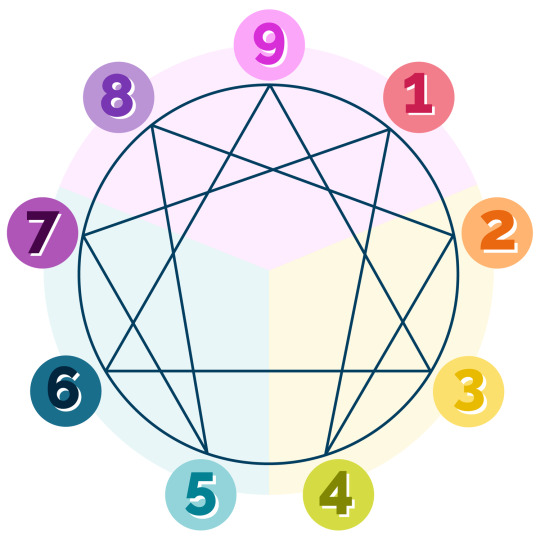
All nine types are interconnected based on how human personality can shift under circumstances of stress or security. Additionally, many people have a wing attached to their dominant enneagram number. Your wing is indicated directly to the left or right of your dominant enneagram number and is based on which personality types tends to resonate with you more. Going beyond basic characteristics one might exhibit, the enneagram digs through what might be motivating a person as well as what might be holding them back from growth in life. From my understanding, the contemporary understanding we have of the enneagram typing system stems from the philosophy of a Bolivian spiritual teacher named Oscar Ichazo and a Chilean psychologist named Claudio Naranjo.
Your dominant type, according to Laura Miltenberger, author of Enneagram Empowerment, is based on what she refers to as our "core fears, motivations, and obstacles."
The dominant types, along with the stress/security types associated with them and the basic characteristics that go along with them:
Type 1: The Reformer- Stress type: 4; Security type: 7
perfectionistic, conscientious, and rational
Type 2: The Helper- Stress type: 8; Security type: 4
relational, empathic, and helpful
Type 3: The Achiever- Stress type: 9; Security type: 6
productive, impressive, competitive
Type 4: The Individualist- Stress type: 2; Security type: 1
sensitive, authentic, expressive
Type 5: The Investigator- Stress type: 7; Security type: 8
cerebral, reserved, independent
Type 6: The Loyalist- Stress type: 3; Security type: 9
loyal, cautious, analytical
Type 7: The Enthusiast- Stress type: 1; Security type:5
optimistic, enthusiastic, resilient
Type 8: The Challenger- Stress type: 5; Security type: 2
confident, strong, assertive
Type 9: The Peacemaker- Stress type: 6; Security type: 3
peaceful, accepting, friendly
So, first things first: Sonic the Hedgehog is (based on my research and knowledge) and Enneagram Type 7w8
Type 7s are considered the enthusiasts in the enneagram. They tend to be very optimistic people and see the world through a very positive lens. I can definitely see this in Sonic. Even thinking about one of his first scenes with Amy in Frontiers, as he absorbed the energy from cyberspace, he was quick to try and find the silver lining in it. It seems like, no matter the circumstances, he always has the confidence that everything will turn out all right. The dude has been through some major hardship throughout the years, and yet his optimism shines through every time; he's a resilient dude (conveniently another characteristic that describes type 7s).
Another thing about enneagram 7s are their sense of adventure that seems to be driven by their desire for spontaneity and impulsivity. For Sonic, this seems pretty self-explanatory to me lol so I won't go too into it (hello adhd king!!)
One of the major hindrances that Type 7s run into in life is emotional avoidance. When uncomfy feelings pop up for 7s they tend to ignore, pushdown, and distract themselves. (and here I will dip a lil into headcanon and shippy stuff soooooo, just a forewarning....) Sonic appears to always be on the run, always looking forward to the next adventure. He's a resilient dude, for sure, but we cannot deny how important it is to sit with the big emotions that come with literally carrying the weight of the world on his shoulders every time something goes wrong. I dunno if there's ever been a time in canon where attention was given to the way Sonic processes all of the trauma he has witnessed throughout his life, and given this I'm lead to believe that he just pushes on constantly. He's gotta have a breaking point, right? With this constant seeking of stimulation added on top of unacknowledged feelings, I could see how this might lead to the eventual degradation of his relationships with his friends and maybe even cause burnout in regard to his motivation to keep the world safe.
As an aside, the whole emotional avoidance also applies to his dynamic with Amy (imo!). I know it's been said that he has mutual feelings for Amy, so I think in this case emotional avoidance can be applied more broadly to emotional connection beyond surface level friendships and rivalry. Something about specific types intimacy seem to be deeply uncomfortable for him maybe this leans in a bit to what brings out his stress type (type 1)? Ones tend to fear messing up and perhaps he thinks that, the closer he becomes with Amy, the higher the likelihood is that he'll make a mistake that would lead to the end of a friendship he truly cherishes.
Sonic's wing type appears to be Type 8. I think a lot of the characteristics applied to Type 8s, to me, feel pretty close to Sonic, but not enough to make it his dominant type. Type 8s are the challenger type and are often pegged as the Leaders of the enneagram. There's a lot of emphasis on power with type 8s which is what makes me hesitate to think of it as his dominant type, as I don't see this as his core motivation. However, the confidence, passion, and protectiveness that come with being classed as a Type 8 definitely fit into Sonic's persona, making 7w8 a much better fit than 7w6.
Amy Rose. Categorizing her proved to be a bit more challenging. I mean, as soon as I saw the basic description for Type 7, I immediately thought of Sonic. But for Amy, I was stuck between Type 4 and Type 2. I've drawn the conclusion that Type 2 seems to be the best fit for my girlie, as the security type attached to type 2s is type 4 and this combination made more sense than the inverse (Type 4's stress type is Type 2).
Type 2s are The Helper, and are basically described as "empathetic, sincere, and warm-hearted." What drives the behaviors of a type two are often their desire to feel needed (i.e. helpful) and loved. I think a lot of what drives Amy's actions can be seen through a lens of wanting to be helpful, and, this is evidenced by her role on Team Sonic. To Amy, from the very beginning, being with Sonic meant being of service with the team. To the point that developing her strengths so that she was no longer the weakest link was a key point of her character in Sonic Adventure.
She is a huge asset and help to the team because she brings her strong intuition to guide the team towards their goals as well as her altruism and empathy to convert enemies into allies and rebuild what had been destroyed in mayhem. She's just so full of love and heart and that is what makes her feel like a true 2. In her power, Amy shows signs of her security Type 4 with her strong desire to develop her own identity and nurture herself as she comes into her own being.
On the flipside of this, when Type 2s let their desire to be wanted and loved tip the scales askew, they can get quite possessive and are prone to neglecting their own needs. Their stress type is an 8, which tends toward aggression and domineering. Given the reactions Amy has displayed in times of stress this makes complete sense to me as she can become quite hot-headed when she feels threatened. Another thing that seems relevant to Amy's character is her tendency to place the value of love on a pedestal, which 2s in their less healthy state have a penchant for. Love is for sure important! But when it becomes someone's number one priority it can cloud their judgement and hinder their ability to develop genuine connections with others which they are naturally so good at when their focus is grounded in reality.
As for Amy's wing, I'd say she leans more toward a 2w3. Threes are the achievers of the enneagram and value feeling, well valuable. At their best, type 3s are described as ambitious, authentic, and energetic. All qualities I see in Amy's characterization. Her desire for self-improvement, the fact that she wears her heart on her sleeve, and the absolute powerhouse she can be in her friendships as well as in battle all fall in line with the description of The Achiever.
~~~
That's kinda all of my thoughts for now. I may add to it as I read more into enneagram types, but I would love to hear your thoughts! Below is my personal connection to the enneagram as well as a link you can follow to see what Enneagram type you are!
I had a friend who had gotten me interested in the subject while I was at the beginnings of my Journey of Self-Discovery and during that time, I discovered that my Enneagram type is 9w1 a.k.a. The Peacemaker as I tend to value peace, compromise, and flexibility (I just want everyone to get along!!! which can be hard in fandom spaces sometimes ;-;). I'm very relationship-oriented, I'm very averse to conflict, and my main goal in life is having a sense of inner peace. On the flipside, discord and conflict tend to freak me out, and I have a deep fear of losing the people I love, and I sometimes have difficulties advocating for myself (I'm getting much better at this! Using your type to consider the places in your life where you can grow is the whole point of the enneagram!) You can take the test for yourself here!
#sonic the hedgehog#amy rose#character analysis#a lil#sonamy#kinda#but not really#mostly just me gushing through the synthesis of two niche interests i have lmao#sth#the enneagram#sonic character enneagram#7w8#2w3
12 notes
·
View notes
Text
What is God?
2024-1-6
Einstein once said, "The more I learn, the more I realize how much I don't know." So what is beyond the known, for us, both individually and collectively?
Well, there are three major answers to it, depending on the way one approaches it. The first is Michio Kaku's less-than-one-inch God equation, which explains everything in the universe, as most who believe in science as the ultimate tool for all problems would think. However, this would presume that humanity would evolve in terms of mental capacity to comprehend the volume and complexity of the world, which may or may not be true. The second is described by H. P. Lovecraft, that is, there are supreme beings, that cannot be comprehended by ordinary human reason. Just like overclocking a CPU, the attempts to so will consume one's sanity. In reality, certain esoteric cults often involve such beliefs by stressing rituals, music and dances rather than preaching. A third is what is adopted by mainstream religions, which seeks the balance between Logos and Pathos, and in their view, the supreme beings are semi-intelligible, and both reason and emotion are needed to commune with the supreme beings.
But how exactly can we explore the unknown? In short, pattern recognition, or the practice of connecting the dots to form a pattern. Often these "dots" are not causal to each other, but they point to a higher law of statics and dynamics. Often, this is the inductive methodology in experimental science, but also, in the Jungian analysis, it is called "synchronicity", an acausal connecting principle. Usually, we think of science as objective, but in fact, it is said to be intersubjective, i.e. a pattern that is recognized by peers. By contrast, religious or paranormal experiences are highly intrasubjective, i.e. a pattern that only makes sense to an individual internally and even momentarily, such as psychosis, revelation, dream, eureka moments etc. Interestingly, in art, music, dance and literature, one sees such intrasubjectivity a lot, too. But because of such intrasubjectivity, geniuses like Vincent von Gogh were misunderstood by his contemporaries like how extreme metal is misunderstood by most people in 1980s. So intrasubjectivity is essential for creativity. If we look closer, is science complete with only intersubjectivity? Without the intrasubjective and unique pattern recognition of the creative individual scientist, the intrasubjective and unique pattern recognition of the referee, and thereby the synthesis of the two, how can the intersubjectivity be possible? Hence, it is easy to see that intrasubjectivity is also the basis of intersubjectivity. In short, intersubjectivity is, in any sense, crucial in exploring the unknown, be it scientifically or religiously.
The unknown might be called the God equation, Lord, Buddha, Cthulhul, Odin etc., but it is might just be the many facets, facades, phases or personas of the unknown, with which some or all of us are interacting with knowingly or unknowingly using different methods. Thus, religion and the debates surrounding it might just be one human pathway to the unknown, not really the unknown per se. Denying our intrasubjectivity, on either sides, is, in fact, a very counter-productive idea.
0 notes
Text
TW for rape mention, general self negativity and just really depressing shit
sometimes I wonder if I do have some sort of sociopathic tendencies bc the vast majority of the time I have very little to no sympathy/empathy for anyone. only for my friends that I deem honorary family like the one close one I have (Chrissy) otherwise I don’t even have any for my own blood family. i could care less about what happens to them. i rlly only care about them bc they’re my only source of care/place to live. the minute i could magically become self sufficient, I’d leave them and never look back. if they died i probably wouldn’t even care beyond the initial shock.
i just really don’t feel like im capable of feeling empathy/sympathy for anyone and i feel like im just a horrible person who can’t feel love and is just cold to everyone. i already don’t think i can feel love of any kind (romantic, familial), and can’t really feel like caring about anyone. I don’t even think i really ‘care’ for my best friend who i consider family. the ONLY things i care about are these: my dog, and doing drag. i just feel so fucking empty and like all of this makes me a bad person bc I literally don’t have the capacity to care about other people.
I know this doesn’t actually make me a horrible person, but I can’t help but think it does. i sure can feel emotions though, mostly extreme sadness or extreme anger, and only the extremes. that’s about all i can feel. does that make me a sociopath? who fucking knows. if it does, then oh well. I’ll just accept it and be alone for the rest of my life because nobody in their right mind would ever want to know me for who i am. i clearly don’t care about anyone and can’t really feel companionship with anyone, so what’s the point in trying to make friends?
im pushing everyone away anyway and im slowly retreating into myself and destroying all of the progress ive made, and im so close to just locking myself in my room and never coming out. I don’t deserve to feel love or be in love. I deserve to be alone and in pain because I clearly don’t identify with being human and don’t even feel human.
im a thing. a thing that shouldn’t have ever existed. i was unplanned and a result of coercion (dad lied to mom about having a vasectomy and his blood pressure meds making him infertile AND tricking mom into going off of birth control and not using a condom) so im technically a product of rape and shouldn’t have been born.
i used to think i was born for a purpose, to do something good, but that’s clearly not the case.
im completely fine, PLEASE don’t call anyone
#plus we’re about to have the first snow of the year#and it’s making me depressed bc that was one of grandma’s favorite things to see#no wonder i see myself in hannibal
0 notes
Text
Kesar Soap: An Up-to-Date Remedies for Current Skincare Trends
Kesar soap stands out as a leader in the ever-changing skincare market, where customers are increasingly looking to natural ingredients. It does this by fusing tradition with modern beauty requirements. This article explores the newest developments in Kesar soap, including its applicability to modern skincare routines and its ability to solve contemporary beauty issues.
The Comeback of Kesar in Contemporary Skincare:
Despite having a long history, kesar has recently become more popular in modern skincare due to the rising demand for safe, natural, and efficient cosmetics. Nowadays, consumers are more aware of the substances they use on their skin and are looking for products that combine conventional wisdom with cutting-edge science.
Benefits for Modern Lifestyles in Many Aspects: Kesar soap meets the various demands of modern living. Its antioxidant-rich makeup acts as a barrier against the aggressors of the modern environment that cause skin damage and premature aging, helping to counteract the effects of pollution and stress.
Synergy with Active Lifestyles: Kesar soap addresses the need for skincare products that can keep up with dynamic routines in a time when active lifestyles are common. Its anti-inflammatory qualities and capacity to calm irritated skin make it a great option for people who deal with the difficulties of city living.
Eco-friendly and Sustainable Formulations: In response to the growing environmental consciousness of modern consumers, skincare brands are developing products that are both sustainable and eco-friendly. Kesar soap, which is frequently made with natural ingredients and considerate production methods, satisfies consumer demand for products that put the health of the environment and human skin first.
Incorporation into Ritualistic Self-Care Practices: The importance of skincare rituals has been highlighted by the resurgence of self-care practices. Kesar soap offers a sensual experience that goes beyond simple skincare, blending effortlessly into these self-care routines with its opulent feel and aromatic profile.
Cultural Affects on Global Beauty Trends: As beauty trends become more global, traditional ingredients like kesar are becoming more well-known all over the world. Skincare brands are leveraging the rich history of saffron to their advantage by introducing Kesar into formulas that appeal to a wide range of consumer demographics.
Customization and Personalization: Personalized skincare experiences are what today's consumers want. Certain Kesar soap formulations are designed to target particular skin types or concerns, giving people a customizable skincare solution that suits their individual requirements and preferences.
Cultural Affects on Global Beauty Trends: As beauty trends become more global, traditional ingredients like kesar are becoming more well-known all over the world. Skincare brands are leveraging the rich history of saffron to their advantage by introducing Kesar into formulas that appeal to a wide range of consumer demographics.
Customization and Personalization: Personalized skincare experiences are what today's consumers want. Certain Kesar soap formulations are designed to target particular skin types or concerns, giving people a customizable skincare solution that suits their individual requirements and preferences.
Conclusion:
Including kesar soap in modern skincare is a calculated reaction to the demands of modern beauty, not merely a nod to tradition. Kesar soap is a versatile and relevant option that offers a harmonious blend of time-tested benefits and contemporary beauty ideals, catering to consumers who prioritize sustainable, natural, and effective skincare. Including this golden elixir in your skincare regimen could be the secret to radiant, resilient skin in today's hectic world.

0 notes
Text
Examining Interracial Couplings in Get Out and “The Comet”
Though these stories are vastly different, they both are centered around the pairing of a white woman and a black man. In “The Comet,” this pairing is entirely accidental. Both characters are seemingly spared from a great tragedy which appears to have wiped out the entire human population. On the other hand, the interracial coupling in Get Out is the other side of the coin: a product of intentionally seeking out a person due to their skin color. But the pairing in Peele’s work is more than intentional; it is insidious.
Rose seeks out Chris not solely because of his race, but also because of the potential capital that her and her family can gain at the expense of Chris’ autonomy and wellbeing. Where in “The Comet” the tragedy allows these two characters to briefly see beyond skin color and see each other’s humanity, the coupling in Get Out only furthers these racial divides. The Armitages see black people as superhuman in physical capabilities while simultaneously seeing us as subhuman in mental capacities, specifically with “determination.”
Ironically, Rose’s role in this scheme causes her to lose her humanity. She spends months slowly infiltrating her victims’ lives while learning their vulnerabilities and assumably sharing her own (whether real or fake). This process occurs with the knowledge that her family will eventually kidnap and commodify the victims’ bodies. We can assume that the Armitage elders taught her not to see black people as entirely human. But Rose spends months becoming extremely intimate with these people, presumably physically as well, stalking her prey. I wonder what must happen in your brain to be able to fake deep intimacy with people while seeing them as subhuman and knowing the horrific fate ahead, yet feeling no empathy or regret. Rose creates a unique closeness with the victims that no other member of the family has. She gives up her human emotions, her sincerity, and even her body all for her family’s scheme and thus becomes inhuman.
To me, Rose is probably the creepiest Armitage because of this. This is exemplified in the scene where she is on the phone with Rod eating dry cereal with her glass of milk. She has human emotions in her voice but they are completely unfound in her face. She is a robot that can only perform human emotions rather than feel them. Her father hides behind thinly veiled double entendres expressing his hatred for black people. Jeremy hardly conceals his true feelings. Misty creates a mirage which makes it difficult to see her true feelings, but uses her mother position to keep the other family members in character. Rose, on the other hand, uses her knowledge of black struggles to pull victims deeper into trusting her, to make them think she “gets it.” She exploits black pain in order to cause more of it.
I think it's worth noting that both of these stories are set (at least partially) in New York City, which is generally thought of as progressive. When people think of the horrors of American racism, they primarily think of the South. But, whether it's 1920 or 2017, so called progressive areas have been far from a safe space for black people. The vigilantes and segregation of the 1920s have become militarized state sanctioned police brutality.
In the end, like Rose, Julia sheds her human connection with Jim in favor of her position within white supremacy. The man who she looked favorably upon, at least for a moment, goes back to being “dirt beneath her feet” the minute she is reconnected with her familial relations.
1 note
·
View note
Text
Tips and tricks for mastering the skill of time management
There are some skills which is necessary for you to acquire in order to be an outstanding employee. throughout your career, you will most likely spend a large amount of time attempting to figure out how to complete all of the duties and tasks that are assigned to you. The practice of organizing and planning how to split your time between specified tasks and objectives is known as time management. Better habits and increased productivity are among the advantages of time management. Improved time management allows you to focus more effectively, gain confidence, and plan your time more successfully.
Types of time management skills
while working on enhancing your time management skill you should be aware that there are 2 types of it.
1. primary time management skill: the key to master this skill is planning ahead, day to day organization, and to be able to set the priorities of different tasks that you are working on which will save your time, as well as improving the rate of your work quality.
2. secondary time management skill: your daily routine is the factor number 1 to hence your time management skills and hence your sufficiency during your day, you can adopt the perfect daily routine by frequent exercise, a balanced diet, and adequate sleep schedule.
How to work on your time management skills at work
1. Create a realistic daily schedule
when it comes to time management arranging a schedule is the way to go, but it has to be a realistic one because people tend to go to the extreme and that will affect you badly, try not to estimate your capacity to get work done, work on setting a reasonable time frame for each task that you want to accomplish, do not forget adding time buffers between jobs so that even if one goes beyond time, the whole schedule remains consistent.
2. start with the hardest task
Start with the most difficult assignment to relieve yourself of the weight; you must complete it during the working day because it will be on your mind constantly, causing you to become distracted and worrying you out. When we let things go day after day, we lose time, motivation, and energy. You need to finish these duties and get them out of your thoughts so that you can concentrate on other things.
3. Be Flexible
the world is changing so also, we have to be open for change. expanding our mentality is the key to success, to experience new things that will help you develop your productivity you need to you should modify your habits and be down to acquiring new means that keep pace with the current world.
4. close the door on the face of destruction
chose who you set next to because working with someone who knuckles down can not only inspire you to do the same but will also reduce the likelihood of being interrupted unnecessarily. Divide tasks into sections. Large jobs can appear intimidating, causing us to welcome breaks and lower our efficiency.
5. Don’t forget to have some fun
Time management is more than just getting things done. It’s also about ensuring that you can prioritize yourself and tracking your mental health. Making time for yourself on a regular basis helps to keep your mental health and life in balance. It might also be beneficial to have things to look forward to during difficult times.
Knowing you have a place to unwind and do activities you enjoy can help you feel more at ease. Whether it’s a gathering with group of friends or going to your favorite restaurant, eating a meal you crave or even have extra hours of sleep on weekend.
6. take a day off from now and then
Taking a day off from time to time does not interfere with being a good employee, as a human being we lose energy and needs time to renew it, so taking a vacation time to rest has a great impact on boosting your mentality. so, once you’re back to work you will have a clear mind empty from any chaos or thoughts irrelevant to your work.
On what level will managing your time improve your work productivity?
Effective time management skills improve your concentration and productivity. They also help to eliminate distractions and procrastination. Taking charge of your time through effective time management boosts your productivity. It also allows you to complete more vital tasks quickly and easily.
Good time management skills boost productivity and allow you to get more done.
Time management abilities assist you in reducing stress and prioritizing your time. Time management that is effective clarifies your goals and prioritizes your most important duties. As a result, you will have more time to produce larger and better results.
You can arrange your day and improve your performance by managing your time. Daily planning boosts productivity. Planning your time is an essential component of time management. Planning boosts efficiency and effectiveness.
It is critical to determine your daily priorities in order to be more efficient with your time. Identifying your priorities allows you to devote your most effective time to them.
0 notes
Text
YOUR IDENTITY
The greatest problem among people is that of Identity crises.
◼ Many people go through life unsure about themselves.
◼ This is a plague that cause people to involve themselves in all sort of destructive activity.
◼ Without Self Discovery, you live a clueless life and worse still, take these clueless state into society and their relationships causing more problems for themselves and for others.
One day a boy climbing the mountains found an eagle’s nest with an egg in it. When he got home, he put it under a hen along with other
eggs. When the eagle hatched, he thought he was a chicken. He learned chicken behavior and scratched in the chicken yard with his ‘siblings.’ He didn’t know better. Sometimes he felt strange stirrings within himself, but he didn’t know what to do with them, so he ignored or suppressed them. After all, if he was a chicken he should behave like a chicken.
One day an eagle flew over the chicken yard and the eagle looked up and saw him. In that moment he realized he wanted to be like that
eagle, to fly high, to go to the mountain peaks he saw in the distance. As he spread his wings he suddenly understood that he was like that eagle.
Though he had never flown before, he possessed the instincts and capabilities. At first he flew unsteadily, then with greater power and control. Finally as he soared he knew he had discovered his true self; the creature God made him to be.
Self discovery thus is:
1. The ability to understand one’s identity, nature and personality or special qualities.
2. The end product of the search into the nature and peculiar qualities of oneself.
3. A clear knowledge and understanding of one’s reason for existence.
4. What happens when one’s mind collides with God’s purpose for his life, giving rise to a life vision IDENTITY.
When you know who you are, it gives you a sense of identity. Originality. Self Discovery eliminates competition and promotes originality. When you discover your uniqueness, you carve a niche for yourself.
Every man’s destiny was predestined before time.
◼ The truth about your identity exists for you to discover it and understand it.
◼ Your identity is not your invention but your
discovery.
◼ You are a product made by a producer. You are a creature made by a Creator.
◼ The discovery of self can never be attained
without a view into the heart of the manufacturer Himself.
1. “WHO AM I?” Q of Identity
2. “WHERE DID I COME FROM?” Q of Source
3. “WHY AM I HERE?” Q of Purpose
4. “WHAT CAN I DO?” Q of Potential
5. “WHERE AM I GOING?” Q of Destiny
6. “WHAT DO I HAVE?” Q of Resource
7. “WHO DO I WALK/WORK WITH?” Q of Relationship.
ONE - THE INTUITION PRINCIPLE
Intuition is the ability to sense or know something without reasoning. Beyond what we are told or what we learn, man is able to tap into another realm of knowledge because he is not merely human or natural but primarily a spiritual being.
Most of the insight man gets about self discovery is usually gotten through
supernatural means – an inward knowing, dreams, visions and even prophetic utterances.
TWO - THE SOURCE PRINCIPLE
If you study your origins you can tell who you are and verify whatever knowledge you get that is based on intuition.
Your identity comes from your source – Natural and Spiritual. There is a principle called the “patha”, principle which states that every thing
produces after its kind. Dog begets dog, Chicken begets Chicken and man begets man.
THREE - THE PURPOSE PRINCIPLE
Apart from the principle of source, this can be referred to as the bedrock of self discovery. Purpose precedes production or creation.
Purpose is the reason for the product. Purpose is the “WHY?” for the “WHAT?”
When you understand the purpose of a thing, it gives you insight into the nature of that thing. What you are made for tells a lot about who you are.
FOUR - THE POTENTIAL PRINCIPLE
Potential is the capacity to do something. In discovering self, understanding potential is very important because it is all you can be that you’re not. The abilities inherent in you that have not yet manifested show who you are. A caterpillar has the potential to be a butterfly Your potential gives you a clue to who you are.
FIVE - THE MANUAL PRINCIPLE
The most reliable way to understand any product is to go to the product manual. That is where you find the specifications and mode
of operation of the product. After God made the earth and made man, He left a manual that guides everyman on the quest for Self discovery.
The bible is the manual for the human product. When you study that manual (the bible), you can never be lost, it is a road map on the road to discovery.
SIX - THE CONTENT PRINCIPLE
You bear the same characteristics with what you are made of or what you carry. For instance, a wooden chair even though it is a chair, bears the same qualities with wood. If wood burns, then the chair will burn too when set on fire.
If you are to value two containers, it will not be based on how the containers are shaped but on what went into making them or what they carry. Your content value helps you understand your true value. Content is what puts value on the container.
SEVEN - THE MODEL PRINCIPLE
There is a seed principle that states that everything you see that God made has billions of the same things contained in it. For instance, in one seed contains millions of seeds because there is a tree in that seed and in that tree, there are millions of seeds which also contain millions of trees that contain millions of seeds to endless dimensions. When God set out to make man, He only made one directly; his name was Adam and from that man made the woman, Eve. Every other man born came in the same form of the first man and the first woman.

0 notes
Text
At the start of our collaboration with the humans one of the first things we had done was asked to access their historical databases, and through that we found they had the capacity for the most selfless and unwavering kindness, as well as the most cruel and horrifying arocities, both well beyond the point of self preservation or common sense. They can ensure countless others will suffer and die out of pure hatred or greed, but they can also give themselves over to certain death just to save someone else will not suffer.
We found they had created both inventions able to save, improve and prolong the lives of thousands upon thousands, but also inventions used to end millions of lives almost instantly.
These were created through a natural curiosity. One that after welcoming some onto one of our ships, we found most seem to share. They want to know how something works, to know why it works, and more than anything they want to know 'what happens if we do this?' Or 'could we do this?'
'How do you power this ship without a generator?' 'Why does that work as a powersource?' 'What happens if you light that on fire?' 'Could that chemical reaction be used to improve the power sources efficiency? ' 'Could we use that chemical reaction to make a planet destroying bomb?'
After asking some questions we found that this curiosity is not taught, but is innate from birth. It is apparently a necessity to keep dangerous out of reach of their young as they are very prone to putting it in their mouths, with no regard for sharpness, size, or toxicity. It is common enough for their young to choke to death on small objects they picked up that they have to put warning labels on products. The humans also joked that once the young are able to begin communicating, they say nothing but the word 'why', however we may need to look into how much of an exaggeration this is.
They are beings that wish more than anything to be an individual. Some will change their apperance drastically, even going as far as to permenently mark shapes into their skin and have metal poking into their body (the process from getting both i am told can be very painful) just to stand out. They tell countless stories in which they can fufull a yearning to be set apart from everyone else, to be special, to have something that nobody but them can do.
Yet at the same time they also want to be part of a group, to have a collective of like minded people around them. The same ways of changing their apperance to set themselves apart is also a way to show that they are part of a collective, dispite in some cases that collective is made up of people who also differ from the norm.
They are hardwired to respond as a collective, to follow the lead of those around them. If one yawns, it sets off a chain reaction as a signal of 'it is time to sleep'. They will follow the others tracks to the point that it carves a pathway through the grass. If one human panics and starts running, a stampede begins, if one human panics and wants to attack, a mob will form.
This mindset is so deeply ingrained in them that it can expand to include pretty much anything into their perceived pack, not only human, or even just sentient beings, but animals, fictional people, fictional animals, and even objects. Much like curiosity, they express this from a very young age, in fact much like curiosity it is even more blatant as a child. We were initially very confused by what the humans meant when they described the purpose of things such as 'teddy bears', and how the young would treat them as a living being. The humans supplied a peice of visual media known as 'Toy Story' to further explain. Although the story seemed to effect the humans to the point of visual emotional distress, they seemed fine after the fact, and we found it very adequately conveyed their point.
In conclusion through our passive reaserch we had found that humans were a confusing mess of walking contradictions.
#space australia#humans are weird#humans are space australians#humans are space orcs#humans are space fae#humans are space oddities#my writing#i know this is unoriginal but it is just a bit of writing practice
1K notes
·
View notes
Note
why does jean warn up to mc so quickly? ikevamp makes it clear that jean is a pretty reserved person and doesn't open up or let people in easily but he seems to let mc in quite quickly and it confuses me quite a bit.
Oh boy, where to begin with this one.
Well, I have a lot of Feelings^TM about this, but I'll try to be concise. Essentially, I think Jeanne doesn't recover in the other routes--or the general storyline--largely because he's just a lot to unpack narratively speaking. And without some pretty direct intervention, he has a hard time healing. MC’s direct intervention was meaningful because it was focused, consistent, and adapted to Jeanne’s specific needs. She also doesn’t make light of his experiences which is key; she fully understands that she can’t fathom what he’s been through. There is a very weighty respect and acknowledgement, a seriousness with which she treats his wounds that’s important.
It’s easy to make this a “why is MC nOt LiKe ThE oThEr GiRlS” but honestly that’s just not the sense I get when I look at all the information available to us.
That being said, I also just feel like every person's recovery from traumatic events doesn't really look the same? I mean Leonardo’s cptsd isn’t going to operate the same way Jeanne’s wartime/Inquisition cptsd is going to operate. Some people require very individualized healing, others will often require a large scale group effort to lift them up.
Typically people don't ever just get over what happened to them and never worry about it again, either. It's usually a process of coping; the hope is that with time you find healthy ways to deal with grief and move forward. Therapists aren't magicians, they just help people process painful experiences/thoughts. It's honestly up to individuals to find meaningful ways to implement these tactics.
Tl; dr: My contention is that Jeanne doesn’t open up or choose to stay alive because MC magically heals him, rather his recovery is a convergence of many people’s efforts and hopes that he stays alive. Gilles (he insists that Jeanne must live, asks him to promise), MC (affirms and bolsters that promise), Comte (makes a second life and recovery possible)--and in no small measure Mozart and Napoleon--all make an active effort to buoy him. As people often say, it takes a village to raise a child.
While Jeanne seems to respond most powerfully to MC’s attempts, it feels more like a product of chemistry/compatibility than it does a random cop out. There is no insinuation that only romantic love can heal; after all, MC gets close to him without any romantic intentions at first. They’re just good friends? It’s more that their feelings simply moved in a different direction after a point, which doesn’t necessarily happen all the time. Jeanne is also incredibly moved by Mozart’s love for him as a friend, Comte’s love for him as a father, and even Gilles’ love as a comrade to an extent. If anything, without their input Jeanne’s capacity for romantic love would be questionable at best.
Now, because I can never for the life of me stop analyzing, I have a more large scale outline of my thoughts below. Spoilers for Jeanne’s route:
If we look at Jeanne's life history, he has pretty specific trauma. Most of the harm he endured was a direct result of human rights violations after the war itself. He didn't enjoy fighting and killing people, but he's also very much a man that sees the reality of his position: it's either kill or be killed. His entire goal was to defeat the enemy as efficiently as possible in the hopes of ending conflict, and with his enormous resolve turns the tide. He had no innate interest in inflicting harm, or lack of control when engaging. He isn't pathological about it, and doesn’t dehumanize the other side. He was more "this was an act of necessity, but those are still human beings." So as far as I can tell he has a very strong moral compass and sense of duty, he doesn't show much delusion/confusion in that regard. (Also evident in his conversations with the young orphan boy.) Furthermore, he has been shown to have a sense of humor--cracking jokes with Gilles and boosting morale for his fellow soldiers.
His childhood abandonment is significant (he left his home because he was "not an adequate farmhand and they had no ability to feed all their children") but I don't know if I would consider it a huge trauma point for him. It seems as though he deemed it an act of necessity--not spite. It was simply the way of things, and he couldn't help his wiry constitution. You'd be surprised how common that was once upon a time, tbh... While it's certainly not right or fair, it does appear that in his perception it was the choice he made and he moved on after he became a soldier. Just focusing on what he could do, rather than everything he lacked. For people in his position, they often feel it is useless to linger on what should have been. There’s no time to linger or doubt, life hangs in the balance.
That leaves us with his time under the Inquisition, just before he was slated to be burned alive. I think this is the keystone trauma point for him, because there are a lot of moving parts to his powerlessness here. The first part is that his entire life's mission--ending the war so that people would no longer have to die and/or starve as a result of senseless violence--was just sabotaged. All those years of doing things he never wanted to do (wartime violence) and being forced to leave his family to ensure they didn't all starve, all of it treated like some kind of joke. Like he didn't sacrifice years of his life and sanity to protect a people who were happy to call him a monster and watch him burn alive. The second part is the overt gaslighting and rewriting of Jeanne's personal history (and overall French public perception) for the sake of the King's political agenda. To call him a treasonous danger to the country when he was once lauded a hero. The third portion is the actual physical helplessness of being arrested, starved, and continuously maimed for no reason beyond pure malice. While it's never right to do that to any human being, this was done to a man who prided himself on his stalwart moral code. To abuse and torture him for something egregious that he would never do (at the risk of death) is just another slap in the face to everything he is and believes in.
I just feel like the context clarifies why that period of time would be the tipping point. His entire moral code and life’s work is being called into question and swept aside, as well as his agency? He believes very powerfully in a sense of right vs wrong, what's fair and what isn't fair. Somebody else deciding that for him--and deciding in a way that is openly unfair/incorrect--further makes him lose himself and his sense of reality. A person in that situation begins to doubt if they are good or bad. His belief in god all the more pressing; if he was a good person, why would fate bring him so much suffering? Honorable soldier or not, his blade has drawn so much blood...
People often reference his stilted social skills (and I am of the belief that he is on the autistic spectrum) as a reason why he is so "people-adverse" but tbh? I don't agree. His memories before the onset of this trauma reveal that he was actually a very warm person, and that people were more than willing to fight under his banner. He had friends, and he had comrades--his country loved him. He was the picture of well-meaning civic duty. Just because he doesn’t integrate smoothly into larger social groups or adapt well to socially shifting circumstances, doesn’t mean he just hates people lmao. When people give him the space to exist within his comfort zone and don’t take advantage of him, he thrives. Compounded by that, we also have his actions in the present to further prove what is true and what isn't.
While he is stern with the orphan boy (I'm sorry I can't remember his name, damn it) there is no malice or cruelty in what he has to say. He doesn't punish the kid or do anything out of line. It may not be fair in terms of the adult level of discretion he asks of him, but the kid also didn't have a lot of options realistically speaking lmao. Same thing with MC, she and the orphan boy are nearly identical in how Jeanne treats them. He's a little rough, but the route reveals that his intentions are just a reflection of what he's been through. He truly believes that if a person isn't strong, they won't survive--because his entire life was a series of trying to be strong/reliable because nobody else would. There was nobody to protect him, and nobody to care for him went things went south. It was him and his sword against the world, and even his exceptional skill as a fighter did not protect him from the Inquisition's arbitrary torture. He has lived in a world where good acts can become absolutely meaningless, where following rules and helping people still gets you slaughtered. That's going to take a considerable toll on his mental health: where do you find the will to go on when the next second of your life could mean the devastation of everything that matters to you?
Spoilers: you don't. Or if you do, every minute of the day is a fight to stay alive. That is the point at which we meet Jeanne. Caught in the hellish whirlpool of wanting more, wanting better--but being terrified of the cost. The cost of hoping, only for his entire world to go up in flames again. It's not a small thing, in my view.
If you have any doubts as to whether or not that is the case, I direct you to literally every singular instance in which Jeanne's emotional sensibility goes visibly dark/south. When do these instances happen? When it rains, for one. And when Shakespeare deliberately starts pressing on his sensitivities: about the soldiers he was forced to kill, about the nation that spurned him, how he's truly "wicked" at heart and doesn't deserve to be happy--seconds before flames erupt for the festival. Does that really sound coincidental? I mean lmao. The rain is a painful reminder, but MC transforms that memory into something a little lighter with her bet. He has nothing to lose in her game, all she does is ask for time with him or offers him something if she loses. There's a playfulness there, a restoration of agency and ease that's invaluable to his recovery.
As for Shakespeare's deliberate retraumatization...I can't even begin to explain how damaging that event was. Shakespeare is undermining Jeanne's agency in that he--not unlike the corrupt monarch of Jeanne's era--is twisting Jeanne's beliefs to work against him. He knows full well that Jeanne doesn't feel like he deserves somebody so bright and understanding (we need to remember it's not really a luxury he's had much in life, especially after the war ended). He knows Jeanne has a tendency to impose that strict moral code on himself even more than he does on others. To reaffirm his every worst fear and lurking terror only throws Jeanne into a vicious downspiral. Jeanne doesn't reject MC out of disgust or hate. He rejects her because he literally cannot handle the concept of trying to be happy again, or of burdening her with his constant struggle to move on while he’s in the middle of a bad episode. He knows he won’t be able to stop reliving the past, that every second of his life and breath will be colored by his gruesome memories. He's trying as hard as he can to keep the intrusive thoughts quiet, to move on. But I'm not going to lie to any of you, that is incredibly difficult to do alone.
The next obvious question is, well why can't the other men help him? This isn't to say that they can't--we see how much solace Jeanne finds in Napoleon and Mozart. Even Isaac is gentle with the veteran. But there are limits to how much they can do. Napoleon is struggling with his own wartime trauma, and it's not identical to Jeanne's. Plus there’s a distinct difference in their sensibilities? Napoleon is the type to habitually seek comfort in helping others when he can't help himself, he's not as in tune with answering his own personal feelings and regulating them. (I mean just look at his new ES: he knows what he wants, but it takes a nudge from Isaac for him to go through with it.) He’s very communally reliant in ways Jeanne isn’t; Jeanne is a very private person, and typically prefers one on one from what I can tell.
Mozart is the definition of repression, and if you look at their interactions it's usually Jeanne that's smoothing over Mozart's rough edges. Mozart says as much himself: that he feels like a rotten friend because he knew Jeanne was struggling with a lot of intense trauma, but he didn't know how to unravel it without hurting him in the process. Mozart calls it personal cowardice, but honestly I just feel like they both had too much going on to be able to help each other effectively. (And Jeanne expresses this sentiment too? This idea that he's not angry with Mozart? He knows they're both carrying a lot, he's just touched Mozart cares about him in return.)
Okay, briefly unrelated, but like. Am I the only one that wheezes uncontrollably when Mozart is like "?????? Idk what it is about MC...I don't want her to be scared of me..." in his own main story in the baths. And Jeanne. IS TRYING SO HARD. NOT TO SPILL THE BEANS ABOUT HIM O B V I O U S L Y BEING IN LOVE. THE HILARITY I CAN'T DO THIS. Jeanne was like "yeah....yeah that's rough buddy.......[screams internally, give your boy time Jeanne he's fragile]"
Honestly? That's the thing about Jeanne too--he has incredible self-awareness and hyperarousal-related (I mean the PTSD kind, get your head out of the gutter) awareness to the people around him. He's very, very conscious of the fact that he is surrounded by geniuses when he can't even write his own name. Just because he has the fortitude not to lash out with his insecurities, doesn't mean he never feels stupid or inferior. And it doesn't help when there are people in the mansion who call him--a fucking war veteran from 500 YEARS AGO--nAiVe. He's not naive lmao. He just doesn't know how the world works so many years later, and it's a ridiculously steep learning curve? Leonardo and Comte are nearly 500 years old, but they lived throughout every hour of that time in a linear fashion. It is a big deal to be moved from 1430 to 1890 in the span of a second asynchronously, and then be expected to function without a hitch??? Given the circumstances he adapts well.
That atmosphere--this constant impatience with what he doesn’t understand, his inability to be caught up to speed quickly--is going to hinder his recovery lmao. He feels like a burden most of the time, and agency and freedom are crucial.
Another thing that occurs to me about the mansion's arrangement is that there is a power dynamic, just as any space with people in it has some level of hierarchy (unless you live with miraculously chill people). Jeanne is acutely aware that Comte is the most powerful being in that space, and he is not only hatefully angry at him--but likely afraid too. We have to remember that the biggest betrayal he witnessed in his life was at the hands of a monarch; it was the aristocracy that turned on him and erased the truth. Comte is openly a child that resulted from both that era and that type of lineage, I don't really blame Jeanne for being wary. He intimately knows how willing rich people are to throw normal folks under the bus to suit their ambitions/whims. Comte, while not deliberately threatening, also seems to be painfully aware of this impression he gives off. His "chad persona" as I've mentioned allows him to navigate his life in secret by necessity, but it’s actively damaging to his son. He can't reveal the truth because of Vlad's betrayal, and he's openly unsettled by what it could mean to be honest. Will they wonder about Vlad and find themselves ensnared under his mind control as Charles and Shakespeare are? Will Comte himself be subjected to the mortifying ordeal of being known only to lose them?? That's a risk he isn't willing to take--and that leaves him in a double bind.
What is it that they say, the truth will set you free? This is where MC and Comte come into enormous play when it comes to Jeanne's recovery. One thing to keep in mind is that most of the people in the mansion have their own traumas they're trying to carry, and I feel like a lot of them are unsure how to approach Jeanne. Or if they do, he's very guarded. It takes a lot of consistent effort to get through to him. What does MC do when Jeanne unleashes his harsh worldview on her? She's understandably frightened, but Jeanne isn't malicious (so she chases him around). In fact, he openly avoids and runs away from her--well aware that what he's done is wrong. If anything, he did it on purpose, bringing us right back to Shakespeare's verbal undoing; why does Jeanne attack her in the first place?
LMAO. He attacks her because she essentially says "oh thanks for helping me!" "I am not nice. Watch yourself." "But you seem like a nice guy to me?" "REEEEEE" Does the pattern become a little clearer? When people think kindly of him, his instinct is to shatter that illusion with an impulsive reprehensible act. When people think poorly of him or lash out, what does he do? When that orphan boy starts yelling and screaming, Jeanne is nothing but calm. He explains the situation, and offers the kid a choice, perfectly happy to be the bearer of bad news. This operates on many levels I’m sure, but I have a feeling it has something to do with him being hailed a saint and a war hero only to be tortured and branded a monstrosity (and he probably thinks being a vampire is doubly monstrous). He’s more comfortable being hated because he feels it’s what he deserves in a lot of ways.
Jeanne has a lot of internalized self-hatred because of what he's done, and because of how much harm was inflicted on him outside of his control (he's Catholic and he was tortured, come on this writes itself). If I'm honest, I think that's actually the greater part of why he hates Comte lmao. Comte refuses the very concept of being cruel no matter how much Jeanne lashes out. Sure he lectures him and scolds him, but he never actively limits what's important to him or controls or harms him. Comte fully realizes the tragedy of how Jeanne's life was used by a nation in dire straits, and knows he needs time and acceptance to heal. No matter how dismal or unhappy, Comte doesn't stop--he fully believes Jeanne should have time in his life where he can really live for himself for once. But therein lies the issue, Jeanne doesn't know how to live for himself.
Which brings me to how MC and Comte "heal" Jeanne. I feel like they give him the space he needs to recover, and that's what results in his gentled temperament and happiness. Remember that so much of his main story is MC endlessly chasing after Jeanne. No amounts of his hissing or running or threatening stops her. Even if his refusals are empty of real dislike, they're enough to deter most people. Not MC. She's able to see through to the depths of who he is, and doesn't just use him for her own ends? She actively seeks to teach him (to read and write) to help him settle better in this era, she actively tries to ease his distaste for rain with a well-meaning bet, and she never gives up on him. (Actions mean so much more to him than words in general too, tbh...). Love is more easily defined by work and effort than it is by attraction.
When he has his episode at the festival, sure she's rattled; but that's because she truly believed that he didn't want to be around her anymore. When she notices he really doesn’t want to be followed, she stops like any normal person would. It’s only when she reads his notebook and sees the truth for herself (that he’s given up despite having the same feelings for her) that her determination is rekindled. She doesn't approach him fearfully, doesn't treat him like he's made of glass either. She just wants him as he is--accepts and loves him as he is. Scarred, bloody, exhausted, abrasive, terrified. She doesn't define him by how easy he is to love. That is a huge issue with traumatized people lmao. Because of their maturity, people always just assume they don't need help, or they rely on them to an extent that isn't sustainable. The second they reveal need or that they struggle, people walk away or victim blame them because it’s easier than taking them seriously.
While MC's attempts may be a little more obvious (cherishing his lily field, wearing the hair pin he gave her, careful about his gruesome injury, really listens when he talks about the horrors of his life and accepts that he experienced a level of agony/terror she can never understand, tries to express her feelings no matter his evasion) I think it's also important to consider Comte's large scale effort. I don't say this to undermine MC, I say it because Jeanne's life was defined by a complete lack of security. He left his parents to make their lives easier, he lived in a war that meant life or death any second, and his country's leader branded him a traitor which lead to his endless torture and public execution. Jeanne does not know a life in which safety is the norm. Point blank. He does not understanding going outside and not expecting the worst anymore.
Comte not only understands that level of despair, but treats it with dignity and respect. He fully accepts being hated if it means Jeanne can use that hatred to live on and find a way to heal. And most importantly, when Jeanne begins to move forward with MC and Mozart's help, Comte never once holds it against Jeanne when the truth is revealed. He's not angry, this isn't about reprisal or reparations or revenge. It's just love.
Jeanne doesn't really have a concept of this? His entire life was mostly transactional, defined by strength and efficiency. Nobody gives a damn about your feelings. You either hurl yourself at the problem or die. Nobody is going to help you or carry you or save you. While he may have had a little more support while he was in the military from his fellow soldiers, that support system was ripped away from him during the Inquisition.
One very common sentiment regarding elongated imprisonment and torture is that survival occurs in pairs. It is an undeniable fact that people need others to survive. It is the nature of who we are. Individualism has never proven to be successful, or if it is, its dividends are astronomically minimal when compared to people working together.
What does it mean to be the most reliable, steady person in the room? Usually it just means you don't know how to ask for help when you are no longer capable of maintaining that stance. Napoleon is guilty of it. Leonardo, Comte, and Jeanne all are too. It's part of why MC and Comte's capacity to see what he needs and provide as much as they can is such a big deal. That sort of consistent support (without a constant necessity to beg for help) allows Jeanne to be able to re-integrate into his new reality and find joy. Even if his nightmares and memories never go away, they are now being actively overrun by positive experiences. That's the thing about recovery, really--it tends to be more about drowning out the negative as much as possible and coming to terms with it, than it is about forgetting or never feeling it again. It’s about softening the sharp edges of pain like sea glass.
So is MC magical and randomly got Jeanne to open up? Nah, I don't think so. I think it was a series of persistence and real acceptance of who he is that made him warm up. People really seem to underestimate how deeply affecting understanding is, but that's how damage is undone. Jeanne can't really linger on the idea of his own monstrousness, his unworthiness, a lifetime of misery, when the person in front of him actively listens and cares about him. Makes him laugh and smile and lose himself in warmth for the first time.
If I'm honest, I feel like people also just...underestimate the level of traumatic resurgence that's perpetuated and inflicted by society’s standards in general lmao. This rhetorical structure in which good and bad exist in moral extremes, this idea that people should be able to recover and never experience relapses or periods of sensitivity. The refusal to radically listen to people and their problems, and make active attempts--not matter how small--to mend/ease those hurt feelings. Granted there will always be people in the world who do not want to improve, but I feel like most people want to. It's hopelessness, silence, and stigmatization that remain the true enemies of traumatized/mentally ill people everywhere. And among that population are always war veterans...
#ikevamp#ikemen vampire#ikevamp jean#ikevamp jeanne#ikevamp meta#ikevamp saint germain#ikevamp comte#sorry i have a lot of feelings about this topic kjahsflkjhsjkghfd#but yes!#i think mc being able to help him was more about her sensibility and the mental fortitude/space to be able to care about him as he needed#i don't think it's necessarily that she's SpEcIaL#trauma is a sensitive subject--especially considering he's a war veteran#but i also think it's simple and complex at the same time#simple in the sense that people really do just need consistent support and love to be able to care for themselves again#complex in the sense that support can come in so many permutations and some of them are very delicate and multi-faceted#and thus must be handled with extreme caution in some regards#anywho not that i'm any kind of expert this is just what i understand and see#also in case it wasn't clear i love him and cry every day (look away comte it's my whoring hours)#though i hope this helps??? i went off harder than anticipated lakjhglkj#thank you for the ask!!! <3333#asks#rambles#not incorrect quotes
94 notes
·
View notes
Text
SPOILER ALERT: This article contains details of the first five episodes of Disney+’s Loki, & maybe the finale. Maybe.
EXCLUSIVE: “I have learned, at this point, having said goodbye to the character more than twice, two and a half times maybe, to make no assumptions,” says Loki’s Tom Hiddleston as the hours tick away to the finale of the Disney+ series drops early on Wednesday morning. “We’ll see where the ride goes now,” the Marvel alum adds.
As always with almost any project from the Kevin Feige run studio, that ride could continue, at least in some form or another. Certainly, the June 9 ‘Glorious Purpose’ premiere of the Michael Waldron penned and Kate Herron directed Loki proved to be the Disney+ and the MCU’s biggest small screen success so far. Also with any Marvel project, past Emmy winner Hiddleston was elusive on what could be coming next, be it in the Loki finale, another season or another appearance in the movies as the MCU shifts into its next phrase.
One thing is clear, after a decade playing the God of Mischief, Hiddleston still has a lot of Loki on the brain, in the best way.Leading towards the finale, I chatted with a UK-based Hiddleston about returning to play Loki and the search for who or what controls the seemingly all knowing, all powerful Time Variance Authority. The Night Manager star also spoke about filming during the coronavirus pandemic, working with Owen Wilson, Gugu Mbatha-Raw, Wunmi Mosaku, Richard E. Grant, and Sophia Di Martino, who portrays variant and soulmate Sylvie, and his upcoming AppleTV+ series The Essex Serpent with Claire Danes.
DEADLINE: There’s a great line in this season’s penultimate episode where your Loki and Sylvie are stunned at watch Richard E. Grant’s Classic Loki recreate Asgard to distract Alioth and you say “I think we’re stronger than we realize.” There seems to be a great resonance in the line that there’s a whole lot of Loki coming in the finale and probably more …
HIDDLESTON: I suppose it resonates with the theme that we all wanted to highlight about purpose and about meaning. Loki’s someone who’s probably been deluded by the idea that he’s burdened with glorious purpose, and that perhaps that purpose has been revealed to be fraudulent or meaningless, and maybe his self-image or the role that he has condemned himself to play is redundant.
His experiences through this story have shown him that there are actually more opportunities available to him, and you know, it speaks to this idea, like, can we change? Can we evolve, and in that evolution, is there room to grow? You know, so, I think the stronger than we realize I think is Loki finally understanding that, really, by caring for other people, that maybe there’s power in that, and I found that very touching, and the whole thing is an extraordinary dream.
DEADLINE: Speaking of an extraordinary dream, you have been playing Loki for a decade now, since the first Thor movie, We know you are going to do some voice work in the animated What If…? series, but how has it been having this series directly centering on him, in all his variants, so to speak?
HIDDLESTON: You know Dominic, I have enjoyed it so much, because I felt it was a gift and a privilege to be invited to come and sit at the table and think about what the show might be. Also, I suppose so many of the things that I’ve discovered about Loki as a character in the comics and a character in the Norse myths, in the canon, aspects that I’ve always thought were interesting, and understandably, there hasn’t been time or space in the movies to explore them.
DEADLINE: In terms of who he is?
HIDDLESTON: Those aspects of him have been externalized and embedded into this new story about identity itself and about integrating the disparate fragment of the many selves that he is or perhaps the many selves that we are. You know, we contain multitudes. Loki certainly contains multitudes. We have met many of those multitudes, including Alligator Loki (laughs).
DEADLINE: Sounds like you’re not done with those multitudes yet. From your POV, from conversations with Kevin (Feige) is there more that you see for the character as the MCU heads into its next stages?
HIDDLESTON: Well, I certainly don’t have Kevin’s brain or encyclopedic knowledge or capacity for invention. I’ve been on the ride for a while, and it’s been the most extraordinary journey, and to have lived through different iterations, different phases of the MCU, and I’m so grateful that I’m still here, and it’s been amazing to watch. I feel that the MCU is even more expansive, is even braver, more inclusive than it’s ever been.
DEADLINE: How so?
HIDDLESTON: I think the stories are getting really exciting. Not that they weren’t before, but I think they understand that the investment of the audience is very deep, and they don’t take it for granted for a second. So, yeah, I suppose the perspective I have on how Loki might affect the ongoing course of the MCU is this idea of the multiverse. People have already understood it when Miss Minutes is introducing Loki to the TVA. She talks about the multiverse and the war and that the sacred timeline, which is reality as we know it.
DEADLINE: It opens up the aperture certainly for new stories from all opportunities, doesn’t it?
HIDDLESTON: It raises questions of, well, maybe there are other parallel or alternate universes. Maybe there are other realities, and the possibilities there are endless. I feel that at the end of episode five, Loki and Sylvie are close to discovering the answers to the questions that they have of who is behind the TVA and that, somehow, this will provoke even more curiosity about…
DEADLINE: …Because in the Marvel Universe, answering one set of questions always leads to another set of questions, in many ways.
HIDDLESTON: Right. Yeah. Yeah, and I know that there are lots of, you know, interesting titles of movies that’ve been announced, which kind of hint at where it might be going.
DEADLINE: One of those that hasn’t been officially announced, but is rumored is a Season 2 for Loki, in gear under the temporary title of Architect on call sheets and the like …
HIDDLESTON: Well, yes, maybe, as I say, all the kind of multiple alternate realities are …it’s taken me 10 years to get a handle on this sort of mono timeline. The idea that this might be a multiverse is actually beyond my knowledge of physics.
DEADLINE: Well, I doubt that, but let me ask, and no spoilers for the finale or further, but if Kevin, Marvel, Disney asked you to do more Loki, are you game?
HIDDLESTON: (laughs) I have learned, at this point, having said goodbye to the character more than twice, two and a half times maybe, to make no assumptions. So, I’m also aware that I’m only playing him because of the audience, really. So, it’s not up to me. But I do love playing him, and every time, I seem to find new, interesting things about him. So, yeah, I’m a temporary passenger on Loki’s journey, but we’ll see. We’ll see where the ride goes now.
DEADLINE: On the ride, as the finale looms, there’s a ton of fan speculation out there and so much that people have hooked on to from the show. So, as the man at the center of it, what was your favorite part of Loki the series?
HIDDLESTON: That there was meaning in the making of it.That we crossed the finish line in the middle of a global pandemic and could create something, and more than ever, I felt really grateful for being able to do this job. I think in this there are some of those questions that we were all asking ourselves in the last 18 months in the show, you know, what do our lives mean?📷I love taking Loki in new directions. I love the contributions of my fellow actors, of Owen Wilson and Sophia Di Martino and Richard E. Grant and Gugu Mbatha-Raw, and Wunmi Masaku, they all brought so much to the table, and I’ll always remember that. You know, I’ll always remember just being in Atlanta with all of them and making our bonkers show. Yeah.
DEADLINE: Making your bonkers show in Atlanta as the world, as America was still in the heat of the pandemic. What was that like, because you were in production and then everything stopped and then you came back, right?
HIDDLESTON: I mean, people have used this word a lot, but it really was unprecedented. I think we did six weeks of filming before the hiatus, and then the production was suspended for four or five months, and we came back. At first, it was unfamiliar because we had to make adjustments, but the thing I remember most of all, quite honestly, is the diligence and resilience and spirit of our cast and crew.
DEADLINE: Really?
HIDDLESTON: Yes, and it remains extremely special for me, this project, for that reason.For me, it just demonstrated the character of these amazing people. It took a huge amount of planning and care and looking after each other. By that, I mean, being in the bubble. So, for many of us, the only other human beings we saw, really, were each other. So, we came to work, and we became a team, and the circumstances fostered this extraordinary team spirit, and so the memory of making it is really my incredible and deep respect and affection for my fellow filmmakers. People like Trish Stanard, our line producer. Richard Graves, our first AD. Kristina Peterson, our second AD. Autumn Durald, DP. Kevin Wright, our supervising producer, and so many others making sure everyone could stay safe and look after each other.It’s really…I find it…it’s very moving, and it’s remarkable, and I just want to salute them all because I couldn’t have done any of it without them.
DEADLINE: In that vein, you have just come off filming The Essex Serpent with Claire Danes for AppleTV+. Very different from Loki, and yet also a tale of what is real and who we are. Is that what attracted you to it on some level?
HIDDLESTON: I read it and immediately connected to it. Read the screenplay, the adaptation. It’s based on a novel by Sarah Perry, which was published in 2016 and is set at the end of the 19th century. It’s an extraordinary story about uncertainty and about our deepest fears and how sometimes our fears can distort our imaginings and how our minds can lie to us. About how we have to guard against that, and Perry sets it in this extraordinary time with a beautiful leading character of Cora Seaborne, played by Claire. Anna Symon adopted it.
There’s this community on the east coast of England who believe that an ancient beast has been awakened by an earthquake and that it’s dislodged all these fossils. But perhaps, it has also dislodged this ancient underwater monster, which has been used to explain certain unusual phenomena. This was in the era when Darwin had just been published a few decades before and people are starting to think, this Charles Darwin, he’s onto something. Still, fear spreads very quickly, and it’s a very fascinating time where science and faith are in conflict.
DEADLINE: When you describe it like that it sounds very Loki indeed.
HIDDLESTON: Maybe the themes are very Loki. Maybe that’s where they join up, but I’m playing a 19th century vicar who is trying to contain his community. You feel very destabilized by all these rumors. So, yeah, to go from Loki to a vicar was definitely new, a new territory.
DEADLINE: Literally and figuratively?
HIDDLESTON: Well, it’s my first significant time in Essex, where we filmed, which I feel embarrassed about. I’ve been to Essex before, but I’ve never been to the very, very eastern, most eastern coast of Essex. It’s the Blackwater Estuary, which then feeds into the River Thames, and it’s a very ancient part of England. It’s so marshy, it’s where in Great Expectations, that’s where Pip meets Magwitch for the first time. It’s all foggy and muddy and marshy and quite atmospheric and a perfect place to set a story about of uncertainty and fear and gothic romance. Clio Barnard directed it, and working with her has been amazing.
DEADLINE: You know, it occurs to me that of all the main Marvel characters, Loki has been such a constant, yet so ethereal in so many ways too. Is it jarring for you to jump back into the role with all the uncertainty it brings?
HIDDLESTON: You know, I’ve always seen it as sort of an extraordinary and surprising constant in my life for a decade. But, I don’t take it for granted because I don’t often…you know, it may end. It has actually ended, and those endings have been conclusive. I really thought a couple of years ago, after I made Avengers: Infinity War, you know, we all know what happens in that scene, and I thought, that’s it.I thought it’s over, and I was really proud to have been part of it. I was grateful for my time, but I thought that, my work would go off in a different direction. So, the idea that I got to come back and have another go was a complete delight, it truly was.
70 notes
·
View notes
Text
YYH Recaps: Episode 1, Surprised to be Dead
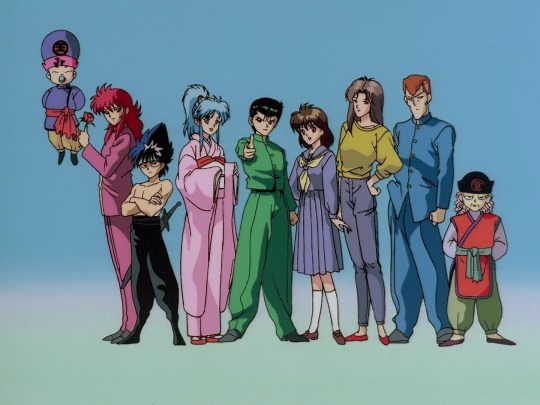
Hello, all you hypothetical readers! It's a beautiful spring day and I have a free afternoon ahead of me, so what better time to start another massive project while I guilty stuff my other WIPs deep into the depths of my hard drive? Yeah. Iffy life choices aside, someone mentioned a few weeks back that they'd love for me to recap a show I have more positive things to say about than negative (RIP RWBY) and ever since Netflix announced that their live-action adaptation of Yu Yu Hakusho is in the works, I've been itching for a re-watch of the anime. With the RWBY hiatus underway, it seemed like the perfect time to fulfill both desires.
Before we begin though, I'd like to touch on a few things that are going to influence this project.
First, YYH is near and dear to my heart. Written by Yoshihiro Togashi in the early 1990s and later adapted for an American audience by Funimation, I had the pleasure of experiencing this story five different ways: as a serialized tale in Shonen Jump, a binge read when I had the money to buy the manga, tiny snippets of the anime on Adult Swim late at night — don't tell my parents ;) — as an after-school treat on Toonami, and then years later as a re-watch when I introduced it to a friend (who, in turn, blessed me by having us watch Fullmetal Alchemist next). I used to keep a Hiei bookmark in everything I was reading, the spirit gun made it into our witch-wolf-space adventures on the playground (middle school was wild), and there was a long period of my life where I tried very hard to teach myself to stand with my hands behind my back, precisely as Genkai does. Spoiler alert: I failed. So to say I love the series is... a little bit of an understatement. I bring this up simply as a way of demonstrating that there's more than a bit of nostalgia attached to YYH for me and that will inevitably cloud my reading of it. How can it not? So that's just something to keep in mind as I work through a series that, like any having hit its 30th birthday, has its outdated, flawed, and other questionable aspects.
Second, but very much connected to the first point, is that these are pretty casual recaps. I summarize and extrapolate, focusing primarily on plot and dialogue (but with the occasional cinematography aspect tossed in). I'm not conducting research on the cultural history here — something that will come up at least once in this episode — I'm not arguing an overarching thesis, and I've never been someone who focuses on the author/production/trivia of a series. I'm here for the story as the story is presented to the viewer. If you've read my RWBY Recaps, this will function precisely the same way, with the only difference being I'm engaging with a finished text as opposed to an ongoing one, so there’s a lot less, “Maybe ___ will happen” theorizing going on.
Third, I obviously recommend that you watch the show yourself (you can find it on YouTube!), but you don't have to know the series to follow along. As these massive paragraphs attest, I tend to be both detailed and verbose, so we'll be covering every major plot point — and most of the smaller ones too.
Finally, I'm working from the dub. I know, I know, the horror. But it's what I grew up on and, honestly, I think it's superior to the sub. YYH's dubbing is in a class all its own and to this day there are very few shows that compare to it. Trust me, it's a good call.
That's enough of the boring chit-chat though. Let's get started!

Our very first episode "Surprised to be Dead" opens on a crowded street. We see lots of traffic, people going about their business, and a pedestrian crossing sign that, crucially, turns red. This is our normality and, like in every genre story, you need to break that normality at some point so that the protagonists can go on their fantastical/supernatural/science fiction journey. YYH eases us into things by first breaking the normality of an everyday afternoon: there's a screech of tires, quick shots of a man pushing a child out of the way of an oncoming car, and then his back is hitting the windshield. We begin this story with a horrible — but otherwise mundane — car crash.
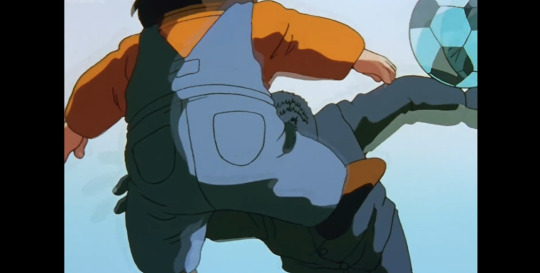
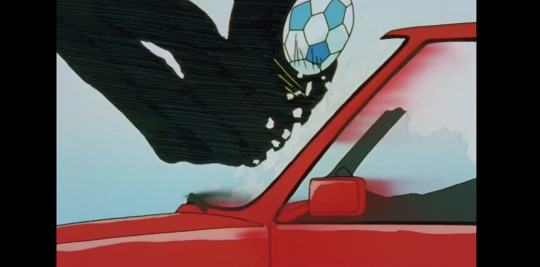
Now, these flashes alone have a fair bit to unpack. Despite later getting a brief shot of the man's scared face right before he's hit, the moment's focus is really on the child. He's the one foregrounded in the initial, slow-mo shot. He's the one who appears in color while the man is kept in shadow. This isn't just a hit, it's a rescue. The camera is also careful to follow the soccer ball this kid was playing with (more on that later in the episode), with it flying through the air as the man is hit and bouncing to a stop in the street, acting as the dramatic finish. It's childhood! It's innocence! It's play on a sunny afternoon! And it's all gone wrong.
This moment is chaotic and even a bit confusing. Not in the sense of what's happening — that is quite obviously a guy being hit by a car — but who the victims are, how precisely this came about, or even why we're meant to care about this beyond a generic capacity to feel for other human (fictional) beings... that's all removed. And it works. As the crash takes place, the camera pans across the stunned crowd and we, the viewer, become a part of that crowd. They don't know what precisely is going on either. We're all just horrified onlookers as a sudden tragedy takes place. We're all watching the same show.
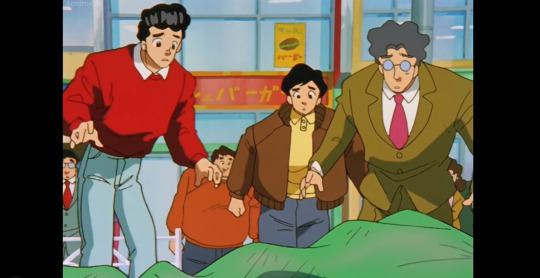
So everyone realizes this guy has been hit. People are staring in shock and someone calls for an ambulance. We see the driver fall to his knees in the street, distraught, shakily saying, "I didn't mean to..." It's a very serious and emotional scene that —
— is immediately tempered by this guy waking up, complete with a cute 'pop!' sound effect when he opens his eyes.

This is YYH's brand, this Very Serious Circumstances skillfully interwoven with casual indifference/comedy. It's admittedly far from a unique brand, but it's an excellent choice given that this is the same attitude that will drive 99% of our protagonist's interaction with the world.
Speaking of said protagonist, our guy wakes up, opens his eyes, and realizes that he's floating. There's a great, disorientating shot from his perspective where everything is upside down, causing him to nearly fall out of the air. Well would you look at that, he's as confused as we are. It's our audience surrogate!
A narrator says, "And so it all begins. This boy's name is Yusuke, he's fourteen years old, and he's supposed to be the hero of this story. But oddly enough, he's dead."
Game of Thrones might have made it popular, but YYH did it better.
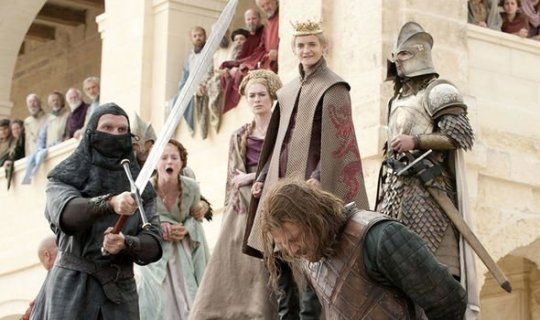
(Yeah, yeah, I know one death kick-starts the journey and the other is a shocking twist. Just let me have this.)
Now, it's a weird introduction, right? At least at the end. The announcement that change has occurred, a name, an age... that all checks out. But "supposed to be the hero"? What the hell is that “supposed to” mean? Our narrator gives us the easy, surface answer: "But oddly enough, he's dead." We're capitalizing here on the audience's expectation that death ends a character's journey and though they may have been a hero previously, they can no longer be one moving forward. That function within the story has passed. So it's this intriguing question of, "What kind of hero do you have when that hero is dead from the start?" but as we'll see soon, there's an additional meaning here of, "How can Yusuke be the hero?" As this premiere sets up, Yusuke doesn't act like the hero is “supposed to” act.
Until he saved this kid.
But right now he's just confused: "Okay, this is weird. Stupid weird."

Two EMTs arrive on the scene and are hilariously useless. You know how in any medical drama a doctor will stop CPR after a couple of seconds because obviously you're not going to spend half the episode on realism? Well, that's this only a thousand times worse. One guy just looks at the kid and announces he's fine except for some bumps and bruises. Meanwhile, the kid is sobbing.
"Well, at least one of them is," replies the other EMT, because I guess he can tell Yusuke is beyond hope without taking a pulse or anything? "I hate cleanup," he complains as they load his body onto a stretcher because that's? An empathetic response to have??
Honestly this scene is wild.
Yusuke is understandably upset that he's, you know, dead and all. He starts hounding the EMTs who, unable to hear him, just go about their business of taking the kid and his body to the hospital. "You think you can just do whatever you want because you have that stupid uniform on? You can't just write me off. Listen to me!" and Yusuke tries to punch one of the EMTs in the head, resulting in him floating right through.
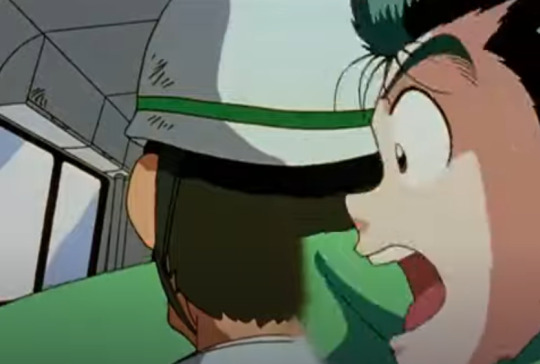
What a great way to introduce your protagonist's personality. We see here that when things go wrong Yusuke's default emotion is anger and it starts creeping in even before he thinks the others are ignoring him: "Stupid weird." He has problems with authority — "You think you can just do whatever you want because you have that stupid uniform on?" — is used to others listening when he gets angry — "You can't just write me off!" — and is poised to use violence at the slightest provocation. Yusuke is a guy who, right now at least, is ready to punch first and ask questions later.
As Yusuke floats back up into the air and the ambulance drives away, he finally cools down enough to try and think his way out of this. "It's not like this is the first time you've been in a jam,” he thinks. Yusuke recalls that yeah, something was different about today...
...he actually went to school.
Catch me laughing that this idiot boy equates the weirdness of him dying with going to school. Good lord.
Anyway, this jumpstarts our flashback. We open on a generic, anime middle school (that always feels like a high school to me) where the principal is calling for Yusuke through the loud speaker. Oooo someone’s in trouble! We follow a young girl up to the rooftop and she gets a classic hair-blowing-in-the-wind moment to establish that she's our love interest. Meet Keiko Yukimura.
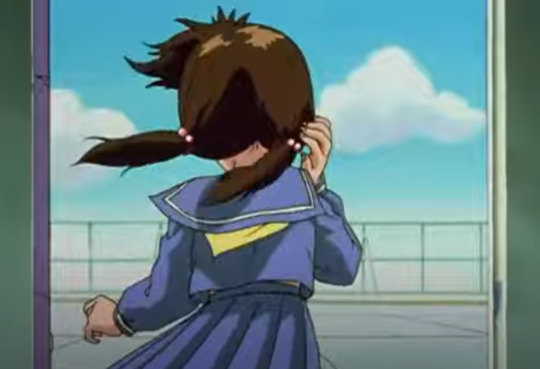
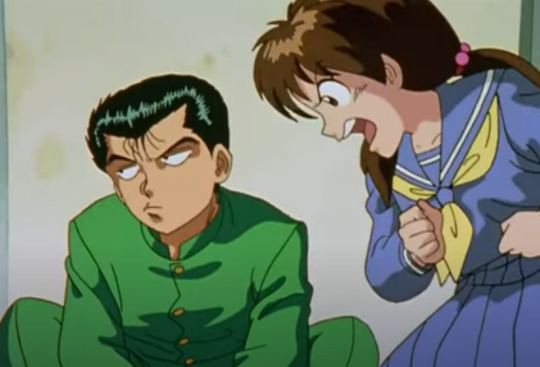
Keiko finds Yusuke hanging out and immediately starts lecturing him for trying to chew gum and refusing to wear the boys' uniform. "Oh, give me a break, Keiko. I look better in green." Note that it's here we learn her name and it's an easy, casual way to introduce it. I bring this up because Yusuke's introduction via our narrator is very much... not that. It's an on your nose statement about his name, age, and importance to the story, and if you're just starting the show in 2021, it might come across as a rather armature move. Like something out of a kid's show, perhaps. Yet here we see that this was a deliberate choice, considering that YYH is capable of introducing character information naturally when it wants to.
This moment also tells us that Yusuke cares a great deal about his image. More on that in a bit. Because Keiko isn't finished her list of grievances yet, going on to say that his attendance record has hurt their entire class, hurt her as class representative, and if he keeps going down this path he won't even graduate middle school. "Sometimes I think you don't care about anyone but yourself and then you don't even do that right!"
They're legit complaints. Too bad Yusuke is busy looking up Keiko's skirt.
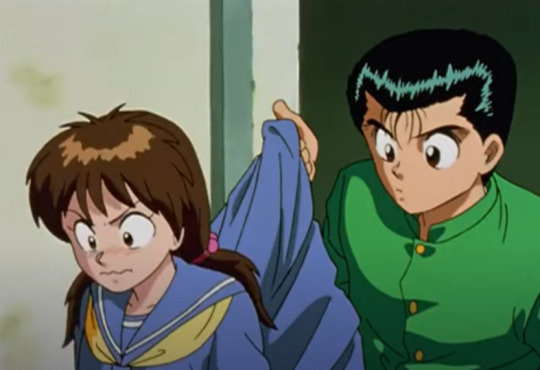
Yeeeeah. Sadly, this is common for anime, particularly a 90s anime like YYH. Even presumably more progressive series like My Hero Academia feature characters like Mineta, whose entire personality is being a pervert, and the creation of abilities that "require" kids/young women to be scantily clad. See: Yaoyorozu. YYH is no different in this regard, with various forms of sexual harassment functioning as a shorthand for how much Yusuke secretly likes Keiko. "Boys will be boys," right? Obviously not.

Like so many others series, the creators get away with it because they’re framing it as a bad thing. It's totally fine because look, Keiko slaps him! This is teaching the viewer how wrong this behavior is. Never mind that this is clearly an established habit between them, that Yusuke laughs off Keiko's discomfort, and that the whole scene is meant to be funny for the viewer. That's the real purpose here; it’s not a PSA on harassment.
That, and to establish the long-suffering love Keiko has for Yusuke in turn, largely stemming from a life-long friendship. "Dumb boy! He hasn't grown up a bit since he was four years old." We see that Keiko's early interactions with Yusuke have given her insight that others lack. As she heads down from the roof she runs into two girls hiding around the corner, too scared to come out lest "the great Urameshi" set his sights on them. Isn't Keiko terrified of what he might do to her? "Or worse, what others might say of it?" Like any classic high school middle school setting, one's reputation is king. Yusuke cares about how others see him — maintaining that tough boy attitude — and the girls care more about what the rest of the school might think of Keiko's interactions with him than the presumed harm Yusuke could do to her. They heard he can summon 2,000 men with just a whistle and that he "kills for fun!" But that means nothing in the face of people talking about you. Despite being one of the most popular girls in school, Keiko is the outsider here via her disinterest in what other people think.
The animation changes here, giving us a good look at how the girls picture Yusuke: tough, scowling, surrounded by shadows, and backed by an entire army.
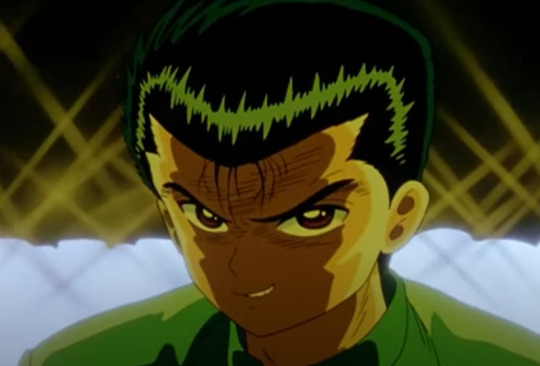
In contrast, we've already seen what Yusuke is really like.

Keiko laughs the image off too. Yusuke is more like a "lamb" than a killer and besides, he couldn't order around two people, let alone two hundred. "He doesn't have many friends."
"That's not what I heard," says one of the girls.
"Yeah," goes the other. "I think we would know."
Again, rumors rule here, with whispers in the hall considered more reliable than someone who interacts with Yusuke on a daily basis. Keiko doesn’t have a hope of changing their minds.
Oh, as a side note, I love that they gave Keiko Miyazaki-esque hair. It's very emotive.

Yusuke escapes outside where the principal is still calling for him to report to his office. He overhears a conversation around the corner and we cut to two boys, one of which is showing a wallet off to the other. He explains that some bully tried to rough him up, but he said he was Urameshi's cousin and the bully took off, dropping his wallet in the process. The guy's friend is impressed, but what is he going to do if Yusuke ever finds out he lied? Not to worry, he says, that "blockhead" would probably think it's true even if he did somehow hear.
Yusuke, obviously, does hear about this and he, also obviously, does not believe this guy is his cousin. He looms ominously and they scurry up against a wall, terrified and offering him the wallet as an apology.
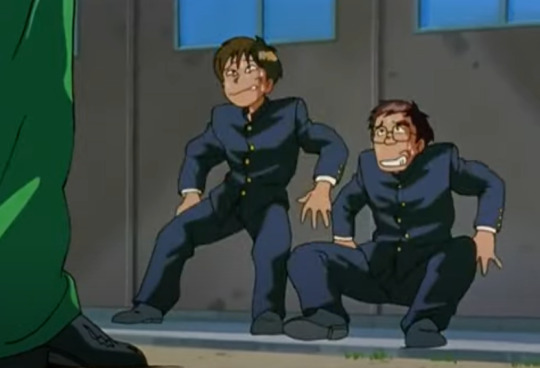
"You think I want your money?" Yusuke yells.
YYH is, in many respects, a rather simple story, but I appreciate the hints of complexity in these otherwise straightforward interactions. It's not that this guy used Yusuke's name to steal a wallet, he used it as a form of protection against another bully — a far more sympathetic motivation. It's not that Yusuke's fearsome reputation has resulted in any genuine respect because once people think they're safe they reveal how little they think of his intelligence — he's a "blockhead." And Yusuke, though intimidating and violent, is not your average, schoolyard bully. He doesn't care about money, only the insult and the damage this guy using his name might have done to his reputation. There's a little more nuance here than you might otherwise expect.
Also, note how dark the boys' standard uniforms are and how much they blend into the rest of the world. Yusuke, as our protagonist, stands out in his bright clothing. He was right, he does look better in green!
So he's ready to clobber this kid when one of the teachers arrive: Mr. Iwamoto.
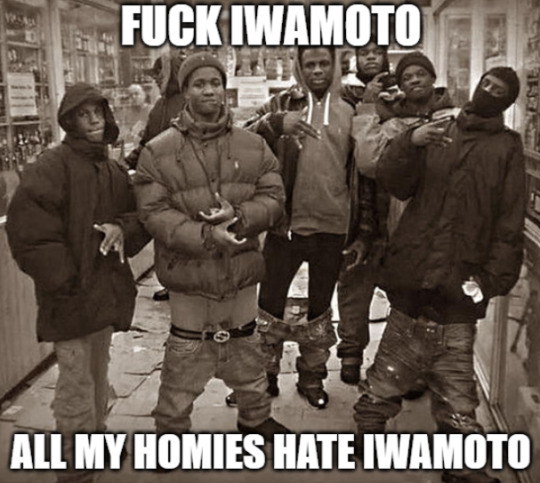
Iwamoto demands to know what's going on, but the boys are too terrified to rat Yusuke out. Noticing the wallet on the ground, he assumes that Yusuke was after their money, something that greatly offends him: "Whatever!" Iwamoto goes on to say that, "No good weeds like you should have been plucked a long time ago," making it clear that he considers Yusuke a hopeless case. The positive aspects that Keiko sees, as well as the complexity the viewer sees — to say nothing of his introduction of saving a kid — aren’t considered here.
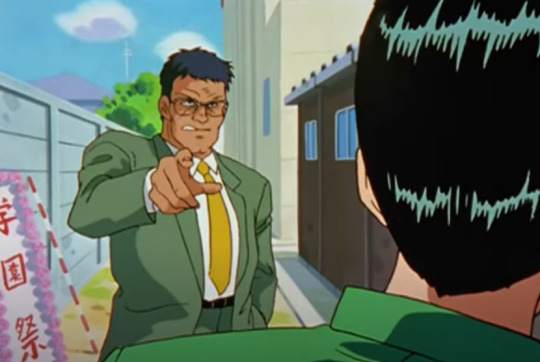
Notably, Iwamoto exists in part to show us what Yusuke could become. Not a teacher (he's obviously not attending school enough for that!), but a cynical man who is cruel for cruelty's sake. Yusuke is already barreling down that path, ignoring Keiko's advice, terrorizing other students, trying to punch EMTs, etc. If his life (or afterlife...) hadn't changed through that accident, this is the kind of person Yusuke might have grown up to be, and we can see that clearly in the visual parallels between them. Dark haired men dressed in green who scowl with ease and toss out cutting insults. Yusuke is staring his future in the face.
For now he walks off with a final shot, "You shouldn't talk. It makes you sound stupid." This time Yusuke makes it to the school's entrance and tries to enjoy his second attempt at chewing gum, but someone hits him in the back of the head.
"Okay, somebody's DEAD — ah. Sorry, old man."
"That's Mr. Takenaka to you."
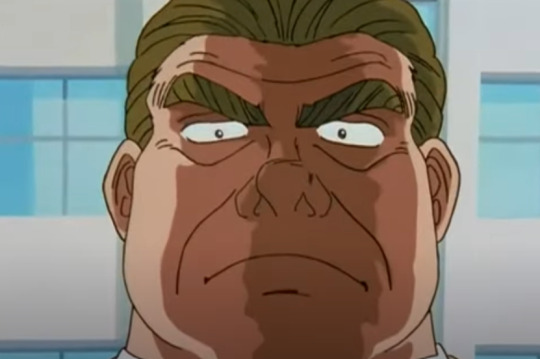
Our principal has finally left the office and hunted down Yusuke for himself! Putting this interaction immediately after the one with Iwamoto allows the viewer to compare them. Yusuke might be irreverent towards his principal, but it's clear there's still some kind of respect between them. Yusuke only starts threatening because he doesn’t realize who hit him and once he does realize it's Takenaka, he immediately apologizes. That "old man" comes across as a teasing insult and Yusuke allows himself to be briefly dragged back towards school, rather than throwing a now classic punch. In turn, Takenaka cares enough about Yusuke to try and keep him on the straight and narrow. He utilizes Yusuke's preferred language — violence — but in a casual way, nonthreatening way: slight hit to the back of his head, noogie, pulling him along by the ear.
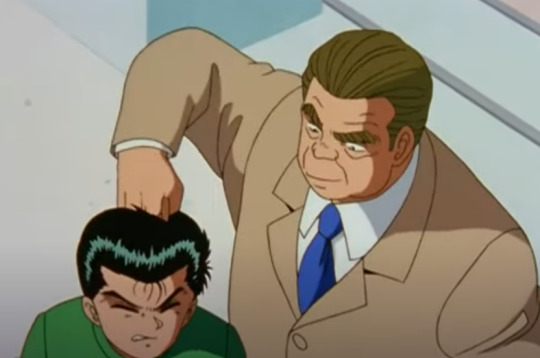

It's the sort of physicality we're used to seeing in media between a parent and child who are outwardly antagonistic, but actually share a deep bond. Takenaka is also careful to frame their return to his office as a "discussion," not a punishment, and offers Yusuke tea along with the conversation. Whereas Iwamoto considers Yusuke to be a "weed" that should have been plucked from their school long ago, Takenaka is determined to help Yusuke bloom.
If we're continuing the flower metaphor :D
Yusuke isn't in the mood to play along though. He gets away by using a fake ear, startling Takenaka when it unexpectedly pulls free. Yusuke escapes the school grounds and Takenaka, suffering a back twinge from his fall, can't chase after him. Poor guy. I understand that pain lol.

Yusuke heads home where we're introduced to his mother, Atsuko. Most notable in her first shot is the soft lighting that highlights her looks. We're not told how old she is here, but I believe she's around 28 — and she looks it, if not younger. Given that Yusuke is 14, that means Atsuko was a mom at his age. This is a quick and subtle way to tell us about Yusuke's home life. There are more overt details in this scene — it's at least lunchtime and Atsuko hasn't left her bed yet, she demands that Yusuke make her coffee instead of greeting him, it's all meant to imply (before we actually see) that she's an alcoholic — but her age is another way to highlight the broken household here. There's no partner in sight and she clearly had Yusuke as a teenager. He hasn't had a strong parental figure to take care of him. If anything, Yusuke is taking care of Atsuko here.
"Oh great, mother of the year!" basically sums things up.
Atsuko wants to know why Yusuke isn't in school and he says that everyone is pissing him off today, particularly with their preaching. "Dear, if you hate preaching so much you should live on your own... but you can't do that, can you?" Alongside a rough upbringing, Yusuke is suffering from the common problem of being trapped in a dead-end life. He hates his school, his town, and coming home to find his mom hungover. Yusuke has no prospects and, outside of one principal, no one who is actively working to help him find some. Even the little things he hates, like being preached to, are unavoidable because if you want to live on your own, that requires money. Good luck pulling that off as a middle schooler whose only skill is street fighting!
Yusuke walks off in a huff, literally shouting in a street about what a bad day he's having (and hilariously scaring off pedestrians in the process). His shout brings trouble though. A couple guys appear to ambush him, their boss close behind. The music increases the tension, Yusuke's expression is serious, and we even get a Dutch angle thrown into the mix.

For any who don't know, the Dutch angle is a popular film technique to establish that something is wrong. There's tension in the scene, something uneasy is at play, and the world is now literally off center. It's perhaps most famously used in Do The Right Thing to establish the friction between an Italian-American pizzeria and the predominantly African American neighborhood it's based in.
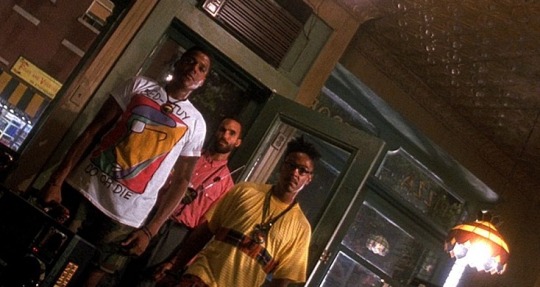
But it's also used a great deal in horror as a way to say: yup, shit just got real. Scary real.
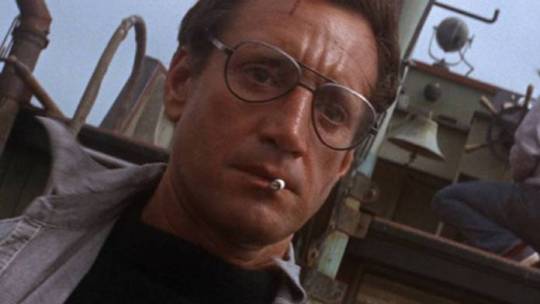
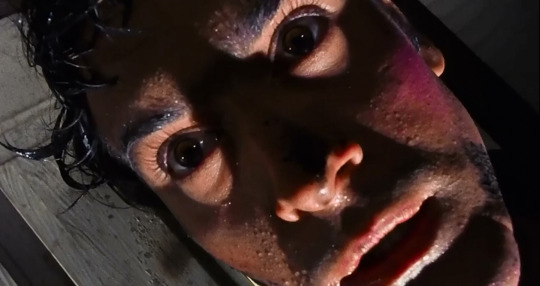
This Dutch angle introduces a character you may not appreciate at first, but absolutely should: Kazuma Kuwabara.

He's initially the comic relief and that's clear in his introduction. Within seconds we move from that intimidating arrival to, well, seeing him. To be clear, I've got nothing against redheads with big chins, but compared to Yusuke's design, Kuwabara is meant to be the funny looking one. His threat level plummets the moment we get a look at his face, especially in a series that will occasionally use looks as a (supposed) measure of intelligence.
Also, Kuwabara is dressed in light blue so, like Yusuke, we know he's important!
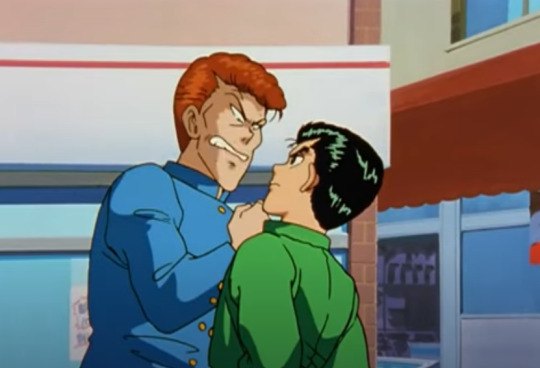
Any assumptions that his appearance isn’t meant to imply a goofy, embarrassing personality are put to rest when Kuwabara starts rambling about how they last time they fought Yusuke just got a cheap shot in and he'll definitely win this time. Yeah, he won't. Yusuke is thrilled by this diversion though and we get a shot of him looking almost as creepy as Keiko's friends think he is. Whatever else might be said about Yusuke, he is absolutely a monster in a fight.

Which we see here. If anyone picked up the series without knowing this was a fighting anime, they'll realize it now. Yusuke's choreography is stylized to show off his skill: he disappears with a 'whoosh' and dark lines to suggest inhuman speed,
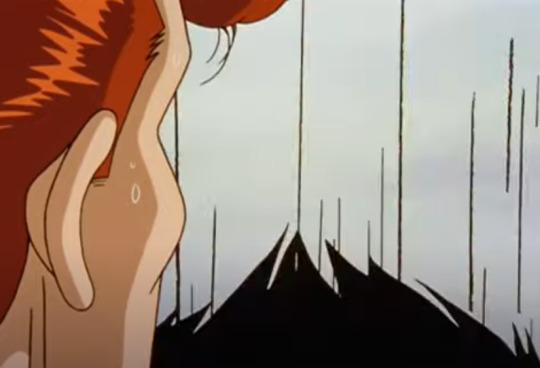
attacking Kuwabara with a knee to the face, utilizes flying kicks, lands perfect, precision punches, and ends it all with the toe-tip landing we've come to expect of all powerful fighters. Kuwabara never even got a hit in.
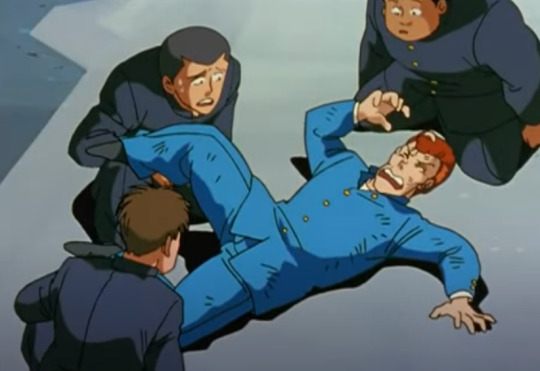
Happy as a clam now, Yusuke wanders off whistling and Kuwabara's friends are left to pick up the pieces. AKA, his likely broken bones. I love that they're legit friends though and not just nameless goons for the sake of giving Kuwabara a small gang (though their names won't come up until later). "That makes 0 wins an 156 loses!" one of them cries, trying to get Kuwabara to stop ending up in the hospital, probably. We establish that Kuwabara is The Most Dramatic Ever when he pulls his broken body into a seated position, shouting, "No! I almost had him that time!"
Then he passes out.
Kuwabara, honey, you obviously did not almost have him, but god bless you for the outlook. The most optimistic thing on this Earth is a well-loved Golden Retriever, but Kuwabara comes in at a very close second.
With his dream to one day beat Yusuke in combat established, we cut to Yusuke wandering the street where the episode opened. "Okay, I'm remembering" he says in a voiceover. "After that I met the kid."
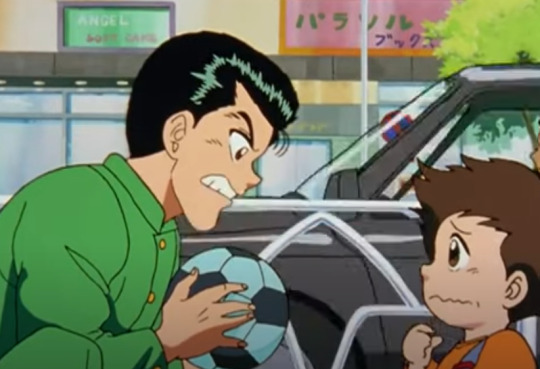
The soccer ball reappears as it rolls to a stop at Yusuke's feet. He grabs it and immediately starts yelling at the kid. Horrible protagonist, right? Well, Yusuke is trying to instill in him the danger of using this street as a playground, a worry the viewer already knows is 100% justified. “Listen, kid, that’s dangerous! There are cars going by that will splatter you into the pavement!” It's one of those quick moments where we get to enjoy Yusuke's duality: he's someone who is nearly making a toddler cry, but for rather understandable reasons. He's got the right idea, but needs to go about it in a more mature manner.
Which is precisely what he attempts to do. Sort of. Yusuke changes gears, though whether it's a more "mature" route is certainly up for debate lol. He tries entertaining the kid instead, raising and lowering the soccer ball to reveal goofy faces.
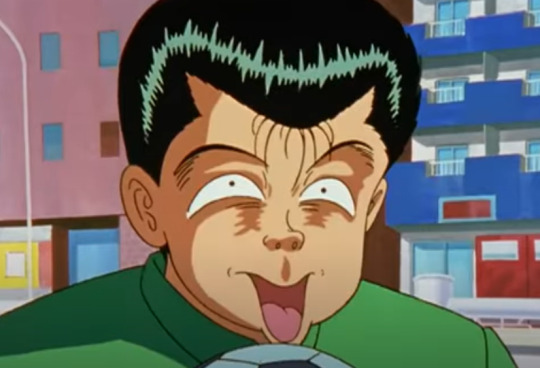
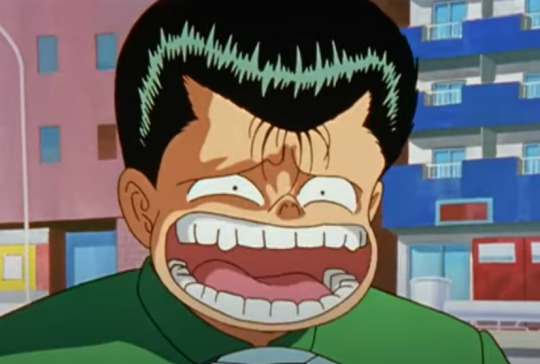
When these fail to impress, Yusuke goes full out by stuffing the ball into his pants, pushing his nose up with a pair of chopsticks he got from god knows where, and generally just putting on a display.
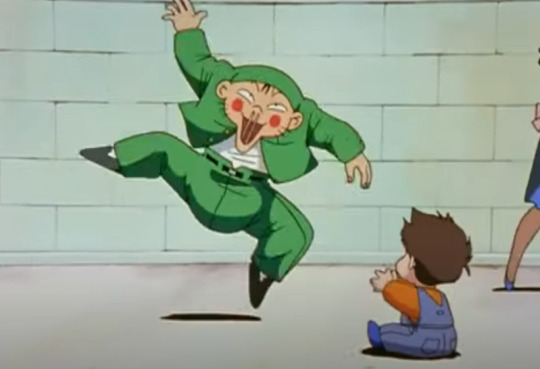
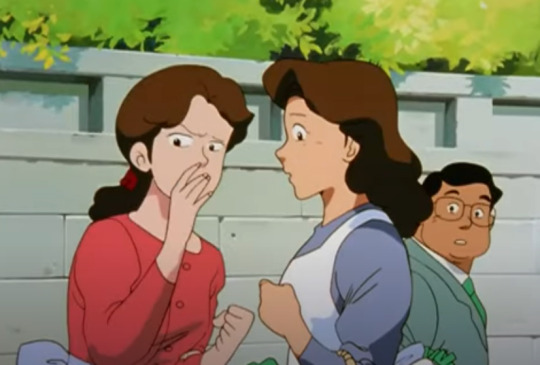
So Yusuke cares very deeply about his reputation... but only when it comes to those who are an established part of his life. Keiko, Mr. Takenaka, and the other kids at school all need to maintain a particular image of Yusuke, one that he's carefully cultivated. But random pedestrians on the street? Who cares about them? Let them talk.
This shows us that Yusuke does indeed have priorities over his own, selfish goals. Namely, the happiness of some kid is more important to him than looking "cool" for a bunch of strangers. Lots of characters with Yusuke's surface attitude would sneer at the idea of degrading themselves for — their words — some brat. But Yusuke, as we constantly see, actually does have that heart of gold. “Well, if all else fails I can still make kids happy.”
Although... I'm not sure what to make of his display itself. I have the distinct sense that there's something prejudiced here that I'm not able to fully articulate, what with the chopsticks, slanted eyes, bald head, and the like, though to be entirely frank I don't have enough knowledge of Japan's history to say precisely what it might be. Or, really, whether it exists at all. Just something to chew on.
What I am sure about though is the importance of having the child label Yusuke as monster — "Yeah, monster! — but in a delighted manner. Yusuke is indeed some kind a monster, someone who disappoints adults and terrifies his classmates, a demon fighter on the streets too, but here that identity is reworked into something positive.
Having successful secured a laugh, Yusuke tells the kid — calmly this time — to go play elsewhere. The toddler stares up at him with the blank expression only kids can manage.
Well, kids and whatever headspace I'm in after writing these metas.
To absolutely no one's surprise except Yusuke's, the kid does not go elsewhere. Instead, he continues kicking the ball down the street, causing Yusuke to exclaim, “Dammit, what’s the use? The kid can get smashed by a car for all I care!” Liar, liar.
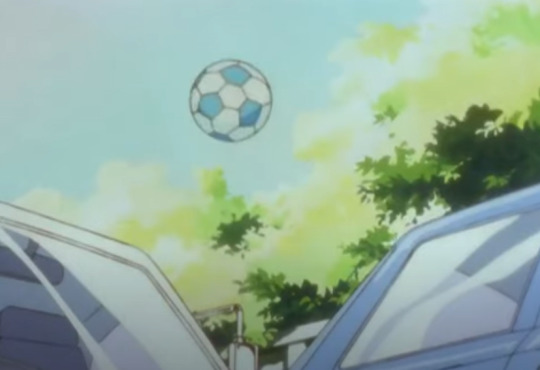
The picture becomes desaturated as the kid kicks the ball and it flies into the street, time slowing down to show it landing precisely in the middle of the road. Yusuke again yells for him to stay put, but when has a toddler ever listened? He begins to walk into the road as our driver arrives, speeding, swerving, and paying more attention to the girl at his side than what's in front of him.
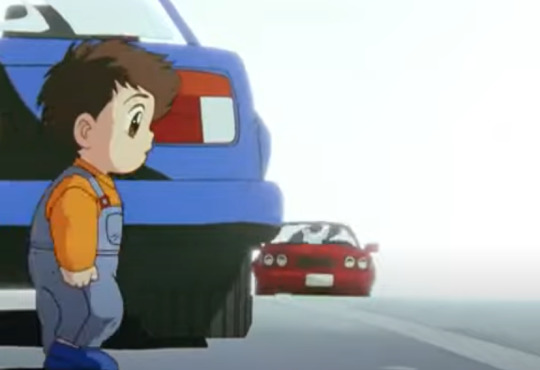
This time, we see the accident from the front with both Yusuke and the kid presented equally.
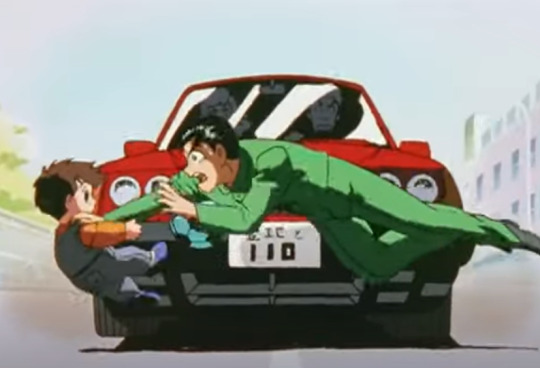
There's a cut to black and when we return we're in the present, Yusuke floating above the policemen now investigating the scene. “So that’s it? I’m roadkill?” As Yusuke realizes he's dead, specifically that he's a ghost, a voice goes,
"Bingo! Bingo! You win the prize!"
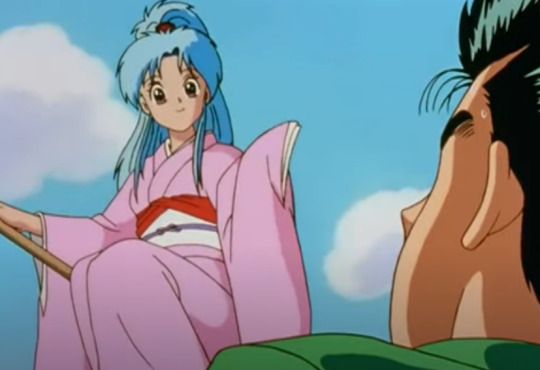
A woman has appeared who is quite obviously othered by the standards of the episode so far. Unlike the greens, blues, and browns of the series' modern clothes, she's dressed in hot pink kimono with blue hair to match. She's also, you know, floating on an oar.
“I didn’t expect you to figure it out so quickly," she says, referring to Yusuke's revelation that he's dead. Apparently, those who meet unexpected and/or violent ends tend to take some time coming to terms with their demise. It's a nice acknowledgment of Yusuke's intelligence in an interaction that's otherwise... not great for his self-esteem.
Meaning, this woman is about to drag him lol.
She introduces herself as Botan, pilot of the River Styx and guider of souls to the afterlife. You might also know her as the Grim Reaper.
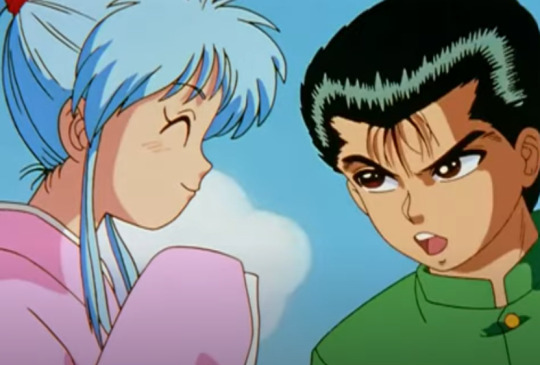
(Hey, RWBY fans: I originally wrote that as Grimm Reaper 🤦♀️)
It's an claim Yusuke takes issue with because 1. Botan is too pretty to be the Grim Reaper and 2. If she was really some god of death she'd be taking this much more seriously, not laughing and saying, "Bingo!" For the audience this does two things. First, it acknowledges our own expectations and validates them. Yusuke's world isn't so far removed from our own that he takes Botan's looks and personality at face value, he also expected a skeleton with a scythe. So don't worry, all the weird stuff in this series is weird to our protagonist too. They'll be explanations. Or, even if there’s not, you’re not wrong for being surprised.
Second, it sets up the very common theme in YYH of undermining those common assumptions again and again and again. We've already seen it with Yusuke, wherein characters who look and act a certain way are, supposedly, destined to be that person and nothing more. Yusuke is meant to be just a "weed," a dumb, violent, angry loser who goes nowhere in life... but we already know he's more than that. Botan is supposed to be scary and serious, but she says nah, I want to be cute and bubbly instead. No character in YYH embodies who they're "supposed" to be when you look past those surface characterizations. They play the part of archetypes — and do keep certain parts of their expected personalities — but they're also far more well-rounded than that. Which yeah, is something most people expect from any story nowadays, but YYH is particularly adept at making you think you're watching Simple Show A only to turn around and surprise you with More Complex Show B.
It's great, trust me.
So Yusuke is pissed that Botan isn't adhering to those expectations, in the same way that he works hard to validate others expectations of him. He doesn't know how to deal with someone challenging his world view yet. Rather than angering Botan though, she just nods and says that this response makes sense for him. “Rather than being scared, or surprised, you yell a lot and tell me I don’t know what I’m talking about." Taking out a notebook, she quickly summarizes everything we learned in the flashback — minus Yusuke's complexities: he's fourteen, in middle school, is ill-tempered, violent, hates authority, and is a horrible student.
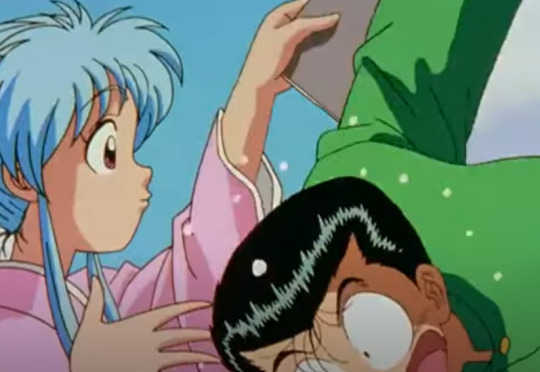
Typically, Yusuke responds by getting angry and trying to snatch the booklet out of her hands, only for Botan to pull it out of his reach, laughing. The tables have turned! Rather than being surrounded by people who cower at Yusuke's imposed authority, he now finds himself faced with someone who laughs at his transparent attempts to take control of the situation.
Calming down, Yusuke wants to know if the kid he saved is really alright and Botan offers to let him see for himself. That offer produces Yusuke's first, genuine smile.

They fly to the hospital where a doctor is in the process of giving the kid a clean bill of health, his mother crying with relief.
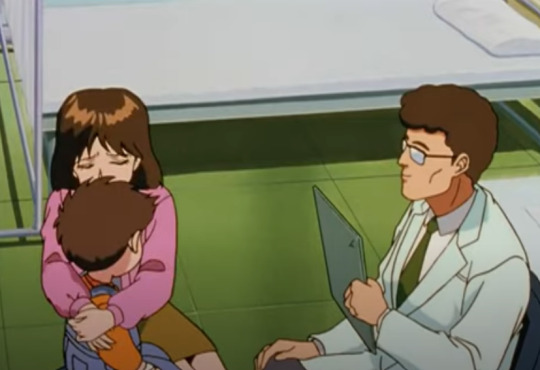
That's enough for Yusuke. “Alright, Botan, I’ve got no regrets, so you can take me to hell or wherever it is I’m going.”
That tells you all you need to know about Yusuke's self-worth, despite his bad boy attitude. His life is a dead-end as far as he can see and most of those around him haven't done anything to dissuade him of that idea. He says he doesn't care if the kid lives or dies, but then instinctively saves him. Post his death, Yusuke doesn't have anything he considers a regret, or anything he'd like to do before he leaves, like saying goodbye to a loved one. Oh, he's also pretty sure he's going to hell and has resigned himself to that without a fight.
Uplifting!
Botan just laughs though, saying that she's actually here to offer Yusuke an "ordeal" that could bring him back to life. See, he wasn't supposed to die today — let alone die saving a kid — and frankly they don't know what to do with him. It's another neat summary of what we've already learned: Yusuke is a far more complicated case than the afterlife assumed and now, when push comes to shove, deciding whether he belongs in heaven or hell is... muddled.
There's a fantastic story there about the problems with an afterlife that reduces a person's entire life to a few surface characteristics recorded in a book, refusing to acknowledge the context of their situation, or their capacity for change. “Run someone with your credentials a thousand times and they never would have saved a kid like that." Except, of course, Yusuke did save him, so those "credentials" are suspect, to say the least. However, YYH is not a story that explores these issues. Instead, I recommend you watch this!
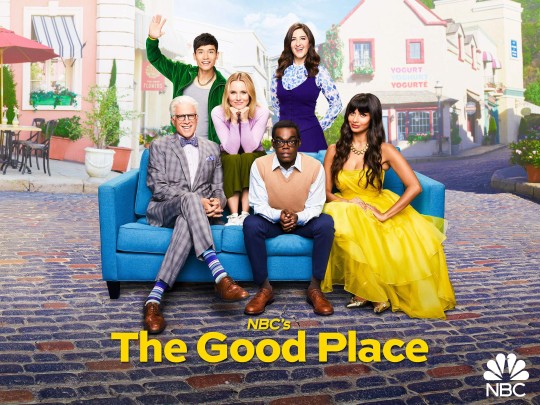
Rather than being upset at the afterlife's low opinion of him (because let's be real, Yusuke shares it), he latches onto a little detail Botan let slip. If he wasn't supposed to die today... then was the kid?
Mmm... no. Actually, without the chaos of Yusuke jumping into the road, the driver would have swerved at the last second and the kid would have not only lived, but actually come out with one less scrape.
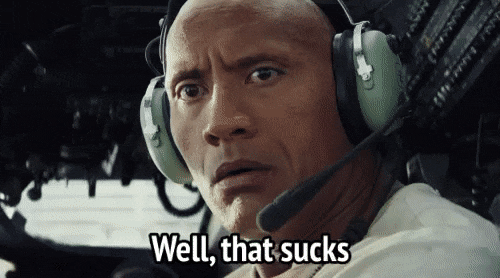
So Yusuke is obviously upset by this news! I would be too!! Holy shit, hang onto the "it's the thought that counts" message with everything you've got.
Also, don't think too much about the fact that the afterlife apparently knows exactly what will happen to people, down to how many cuts they accumulate in an accident. Also, don't think too much about where the afterlife foreseeing the crash begins and the unexpectedness of Yusuke interfering ends. That way lies madness. This will never come up again, so just let it go.
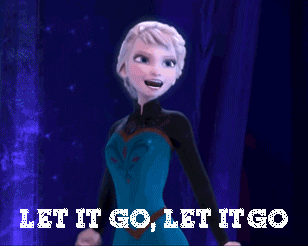
Sorry, 2013 me hijacked the post for a second.
As said, Yusuke is understandably upset by this revelation and as he fumes I'm reminded that this series likes to pull some amazing expressions.
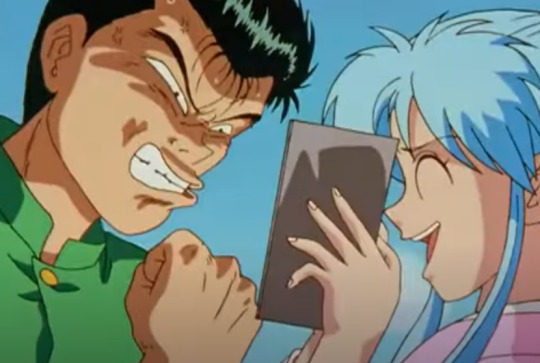
Botan reiterates that it's all fine because Yusuke can come back to life. Weren't you listening? He should feel honored, in fact, considering that an offer like this only arrives every 100 years or so. Well, that explains why all of humanity isn't grappling with people coming back to life on the daily. One person every generation isn't going to cause much of a stir.
However, instead of jumping at the chance Yusuke announces that Botan is just like the teachers at school: she doesn't know what she's talking about. “You said yourself my life was kind of pathetic, right?” he says, going on to explain that everyone will be happier now that he's dead. His school won't have to deal with his behavior, Keiko won't have to nag him, and his mom will be able to party whenever she wants. It's a win-win for everyone involved.
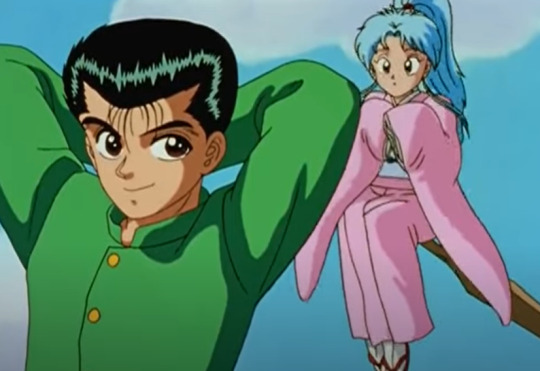
Hmm, this feels familiar.
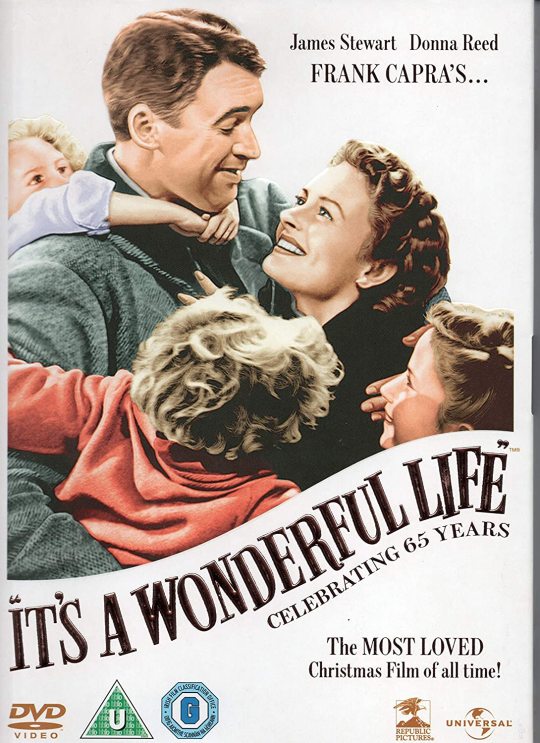
Don't worry, Yusuke doesn't need to experience a whole alternate reality to get the message.
“I’m sorry you feel that way at such an early age," Botan says and she is sorry, because despite her teasing nature that's a legitimately horrifying thing to believe. Yusuke won't budge though and after a little back-and-forth Botan leaves, telling Yusuke he should think it over while visiting his wake. She'll come back once he decides what to do.
“Do you have worms in your ears, lady? I did decide!” but Botan is long gone.
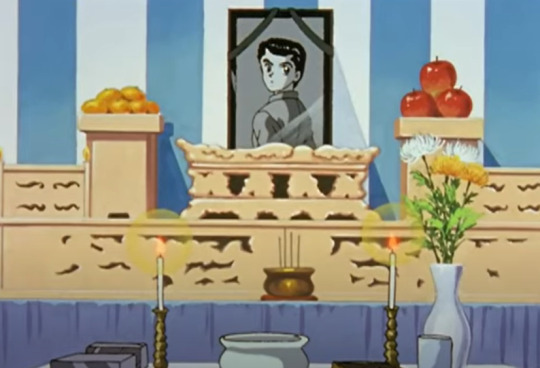
We cut to that night where Yusuke has indeed decided to attend his own wake. Maybe because of Botan's advice, maybe because he's just morbidly curious. We’re not given insight into the decision.
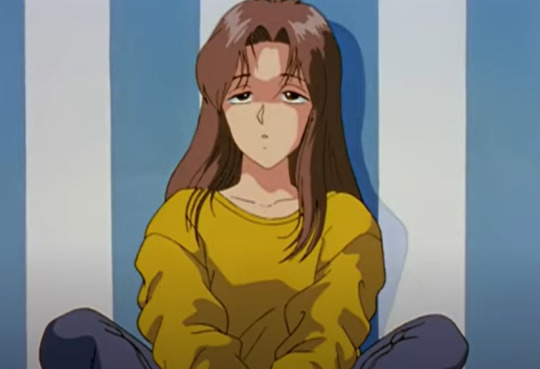
Atsuko is a mess, to put it mildly, not dressed for the occasion and sitting slumped against the way, staring vacantly as the guests offer their condolences. Yusuke is surprised by the fact that his entire class is here, but quickly writes them off when he sees two of the boys laughing. I'm on the fence about this detail, which I'll unpack in just a second.
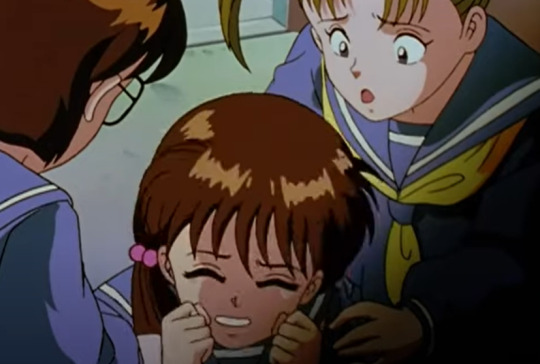
First though, Yusuke sees Keiko exiting the house, inconsolable in her grief. She collapses on the ground with her two friends trying to offer comfort, despite the fact that they had nothing good to say about Yusuke himself. Good on them.

Before he can think too long on this though, Yusuke is distracted by Kuwabara's arrival. Unlike Keiko's crying, he expresses his grief through yelling. Specifically, yelling at Yusuke. For dying. For daring to "run away." His own friends are physically holding him back as he charges into the wake, screaming, “Who am I gonna fight now, huh? Who am I gonna fight?" It's not really about the fighting, of course. At least, not the fighting alone. "You’re supposed to be here for me," Kuwabara finishes, the punch he's thrown at Yusuke's photo going limp and catching his first tear.
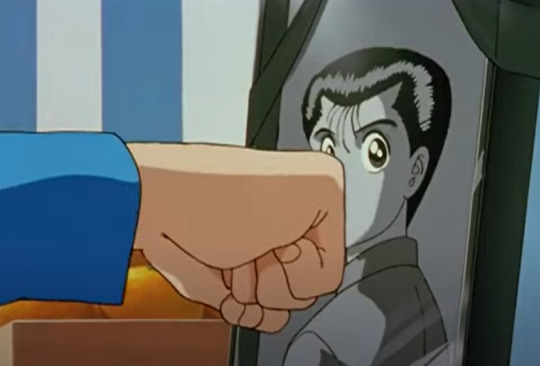
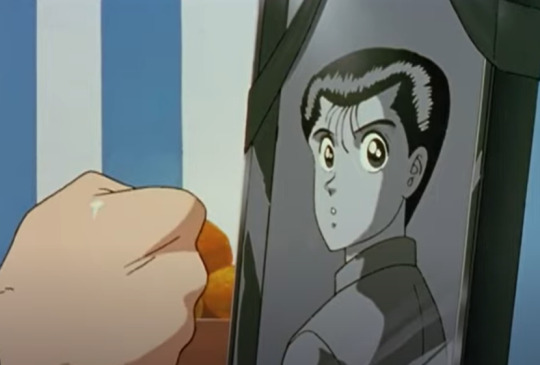
You know, for all the goofy expressions, this show really is gorgeous. Just wait until we get to the fight animations.
Kuwabara's reaction is why I hesitate to write off the classmates like Yusuke has. Granted, we have no reason to believe that they care for him as Kuwabara does — they're nameless background characters defined only by their terror of "the great Urameshi" — but it's still a split second taken out of context. We don't know what they were laughing at, or if laughing is a part of their grief. God knows I personally laugh at the most inappropriate moments. If you tell me someone has just died there is a very good chance I will laugh awkwardly as I try to process that. It’s just a reflex. All of which I bring up not because these side characters are important, but because Yusuke's perception of his own worth is. The point of each of these moments is to show that those around him have always cared for him, even if Yusuke didn't notice. It's nice to think that extends to his classmates too. The variety likewise exists to show us how people grieve differently, with Kuwabara's friends not understanding that this is how he's working through the trauma: “This place is for mourning!” He is mourning, even if his way of mourning isn't as socially acceptable as Keiko's. So if screaming and throwing punches is valid, crying is valid, staring stoically in a drunk stupor is valid... why not laughter too?
Not likely, perhaps, but possible.
As an additional possibility to chew on, watching this premier again, it struck me how more emotional Kuwabara's scene is compared to Keiko's. Don't get me wrong, crying and calling Yusuke’s name gets the point across, but it's two seconds of generic grief compared to a much longer scene rife with intensity. When Kuwabara arrives the music swells and everyone is forced to pay attention to him. His grief is loud, violent, and given symbolism with his fist and the photo. There's more effort put into his reaction, frankly, so it wouldn't surprise me if fans started shipping them after this. That grief combined with an "enemies to lovers" possibility is a pretty potent mix. To be clear, Yusuke/Keiko is the (oh so obvious) canonical endgame and in the fandom Yusuke/Kuwabara can't compare to another slash ship that will turn up later, but this is a good example of how writers can craft some Very Gay Scenes without realizing it. When you have the girl crying prettily for a second and the guy absolutely losing his mind over Yusuke's death, questioning his purpose now, his support network, and then collapsing in grief... don't be surprised if your audience goes, "Oh hey, maybe they'd be a good couple instead."
But I digress.
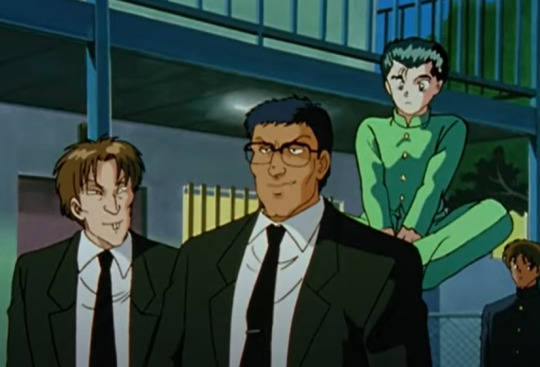
The only people who are unquestioningly happy about Yusuke's passing are Mr. Iwamoto and his co-conspirator, Mr. Akashi. You know Akashi is another bad guy because he has bucked teeth and "ugliness" is an easy way to code for evilness. YYH is not immune to those mistakes :/
These two are really something else though, standing in the middle of a wake and claiming it's “too bad that car wasn’t big enough for them too," referring to Kuwabara and his friends. Wow! What stellar members of the academic community. Iwamoto goes on to say that Yusuke dying at least accomplished something good. Not, mind you, saving the life of a child, but rather looking good for their school's reputation. Akashi agrees, but says it's likely Yusuke only accidentally saved him while trying to steal the kid's lunch money. Remember, that accusation of theft is the one thing Yusuke has said outright that he does not do.
He's pissed listening to all this — wouldn't you be? — but knows by now he can't do anything about it. In another fantastic shot, Yusuke hovers his hand over Iwamoto's shoulder, desperate to grab him, when Takenaka's arrives there instead.
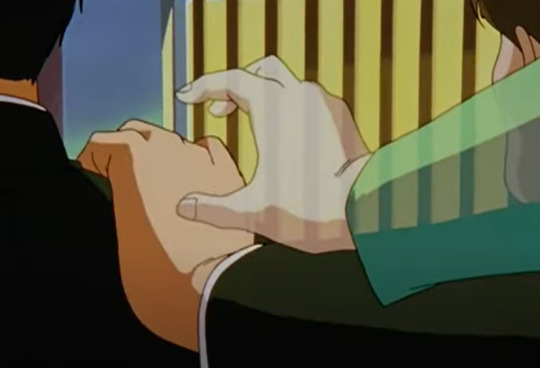
“What do you suppose is more disgraceful? That boy showing his misery, or your insensitive and idiotic words!”
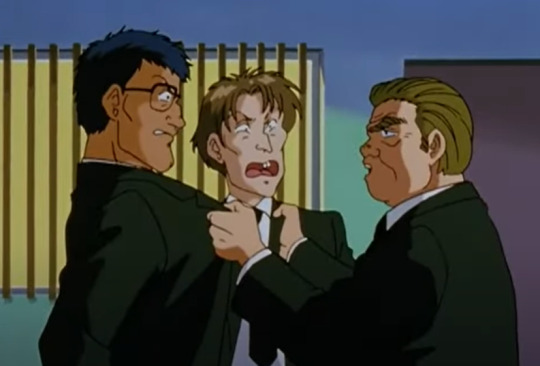
HELL YEAH. You tell 'em, Mr. Takenaka.
Yusuke gets his third shock of the night at this passionate defense. Takenaka leaves the teachers to go pay his respects, but admits to Yusuke's picture that he just can't speak well of him. He was surprised to hear that Yusuke gave up his life for another and it's a fact that he acted selfishly. Though he doesn't say it in as many words, Takenaka explains that he's not grieving because Yusuke was a good person, but because it's so clear to him that he might have been. “Why didn’t you stay? You could have made something great out of yourself.”
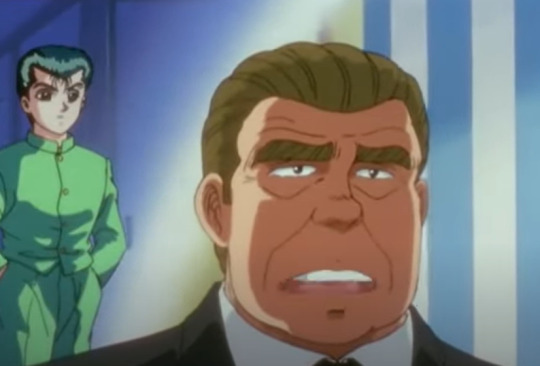
Normally, "Why didn't you stay?" is just something for the living to grapple with, as the dead obviously don't have any say in what happens to them. But Yusuke does. It's here that the lighting grows soft again and Yusuke considers Takenaka's words. Keiko and Kuwabara grieve for who he was, but Takenaka grieves for who Yusuke could have been — someone that might still exist if Yusuke decides to undergo this ordeal.
Atsuko adds fuel to the emotional fire, breaking down and hiding her face in her knees.
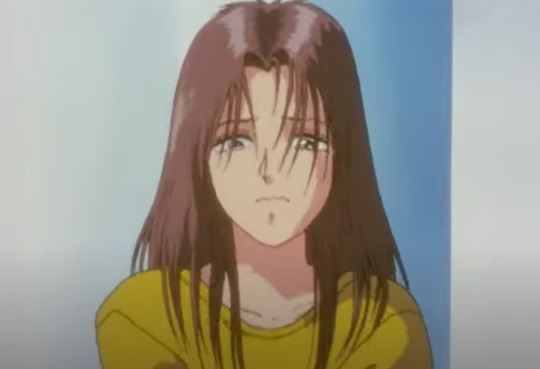

Finally, the kid Yusuke saved arrives with his mother. Because yes, Yusuke saved him in every way that matters, considering no one else knows — or will know — that he'd have lived anyway. I like that the show doesn't allow that knowledge to undermine the emotion of their arrival, or what Yusuke’s act meant to them.

The mom tells her son to pay his respects and the kid thanks Yusuke for saving him, and for "making faces." He clearly doesn't get what's going on here. This is confirmed as the two leave and he asks his mom if he can play with Yusuke again tomorrow. “I know some people sounded angry at him, but he’s really nice!"

They're probably just crying because they want to play with him too, he thinks, which just makes his mom join in. Everyone is crying in this club tonight.
Those words are the cincher for Yusuke and with a brief montage of all the grief he's witnessed, he makes his decision.
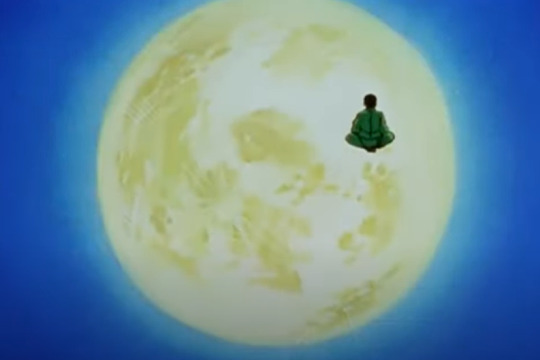
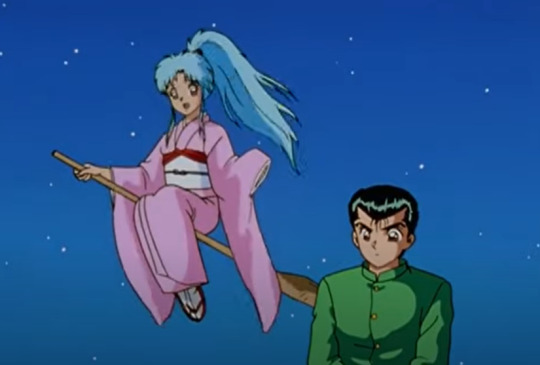
We cut to later that night where Yusuke floats above the city, admiring the moon. Botan reappears and he asks, “Have you ever not known about something that seemed obvious to everyone else?” Yes, everyone has experienced that at one point or another. She asks if he's made his decision and Yusuke agrees to try and come back to life.

Emotional revelations out of the way, we're allowed another tone shift as Botan yells with joy, speeding off and causing Yusuke to grab hold of the end of her oar, lest he be left behind. Cranky as always, he demands to know where they're going. "To the spirit world, of course!" They're off to see someone who can explain the ordeal and give Yusuke the tool needed to complete it. Just hang on and enjoy the ride.
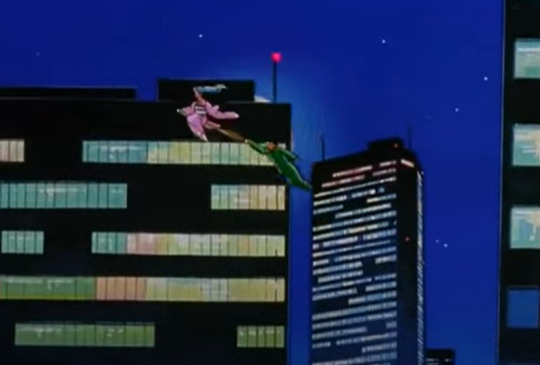
Thus ends our very first episode! Ah, the nostalgia. This is part one of a four arc series, with the anime cutting out a lot of the filler stories found at the start of the manga — a smart decision, I think. They primarily do the work of teaching Yusuke what he learned at the wake, so if you can accomplish that as quickly as the adaptation did, all the better. Especially since Yusuke needs to grow a great deal beyond the basic understanding that people might, sort of care for him, and that work will occur primarily through a job he's going to take on. The series isn't really about his death and it's not about an attempt to come back either — it's about what happens once you get that second chance. So this is the setup, but it's important setup all the same.
No need to skip ahead though. I've blathered enough for one recap. I hope you enjoyed and I'll see you when the writing gods next bless me with energy! 💜
45 notes
·
View notes
Text
Camp Here & There E11-20 Sentence Meme
Slightly altered for roleplay, change pronouns as fit. Faint Themes of Death, Manipulation and Horror. EP 1-10.
You ever come across that statue, do not look her in the eyes.
He has told me that his dreams tend to heavily feature cinnamon.
Kind of cheating, but, I mean, if I didn’t want it to happen, I should’ve made a rule against it.
I love a little intrigue as much as the next guy, but you aren’t being paid to entertain yourselves.
But this beauty — like all things — was not meant to last.
Your behavior today was unacceptable, and I intend… to correct it.
I’m beginning to think that he doesn’t care about me at all anymore, and… part of me wishes that he’d just admit it.
I guess I’m just being delusional or something. Delusional, and stupid, and annoying … ahaha.
One day… I’ll feel it crawling around under my skin…
I probably killed more of those plants than I kept alive
Don’t eat the gosh darn flowers!
This wire is pulled so tight it could slice right through you!
I rather expected that if he came at all, he’d just sit down on a mossy stump and brood, yknow, dragging his hands down his face the way he does.
And through the grisly bite marks all over her body, we could see all her joints and tendons rotating and stretching far beyond capacity…
I haven’t been touched so gently in years.
It was cozy and safe, like a prison.
I knew they were dead, and kept only in mockery, rather than as an extension of their existence like many wish to believe.
It made me sick. It felt like home.
You despised your lying, poaching grandma.
There’s a ghost in it.
Of course I respect you. And I know I seem distant, but I always make sure to listen when you tell me things. Now don’t worry about that.
I know I’ve constructed a few effigies in my time.
He’s got a debilitating fear of shelled animals, and educates himself on such matters in order to ensure his safety.
Choking down your screams when it hurts so much you feel like you might die… is something only humans should do.
It’s because the only thing I can control in my life is my own mind, and he takes that away from me.
The possibility that that man could permanently damage my ability to trust or control my own mind… I can’t think of anything more terrifying.
They’re not — they aren’t supposed to reply.
I’ll just assume they’re all ignoring me, like they always do.
Well, speak the Queen’s English if you want me to comprehend you.
It sounds positively romantic. I’ve always wanted to be killed by something that loved me.
But mere moments later, they all came stampeding out, screaming their heads off!
A slithering monstrosity living in the pipes, I can handle.
You have to believe me, this is going to hurt me as much as it’s going to hurt you.
We can’t protect them forever.
That’s a shitty, lonely way to live.
The things that live in here must want us to lose track of time.
Because their stories about him come off to me like the products of a kid’s imagination.
You’re one of the few people around here who usually uses his head.
Sometimes you have to be honest with yourself that — trying to help certain people in certain situations can make things worse for everyone.
I’m terrified by the way that man made me feel. What about my safety?
Ahh. It’d be manipulative to show you. I’d only be causing trouble.
Men. Men sure are mysterious.
Life is the same no matter where you are… you get itchy. You get hungry. You get hurt.
I like animals because they never forget to be scared: of starving, of getting eaten, of getting hurt or sick.
I should never have forgotten to be scared.
Better start appreciating that precious youth of yours, because it is once again slipping through your fingers like sand!
A fate which, I imagine, is far worse than death. Though they would both be changeless states, at least oblivion frees you from the pain of awareness!
Even a mysterious, stalkery hooligan needs to take the day off now and again.
But it’s good to know if we ever need to defeat him, we can just unplug a lamp or something.
At the very least, please stay away from the cats.
To think, back then, I thought my life couldn’t possibly get worse.
We’re here to set the record straight: feeding someone one of these oranges would legally be considered assault with a deadly weapon.
If anyone’s organs have gone missing, I want to find out before your parents do!
Take this opportunity to let go of the idea that your struggling will get you anywhere. That you even have anything to struggle for.
I feel like the bread at the bottom of the bag, squished out of shape by the twist-tie, with the crust on the back.
I just have to bend, and bend, and in no particular direction, until eventually I snap.
I was wondering how that was possible. How he could love something so much… and forget to feed it.
If he didn’t value these creatures when they were alive, why was he so affected by their deaths?
But I like endings; I like closure.
Ha. Abandoning your child in a lake . . . . so that’s what motherhood means for you?
Since then, I’ve spent a lot of time teaching myself what love is like.
He’s already controversial enough with the local bee community.
Ah, “friend,” is it? Is that what you two’re callin’ each other these days? Eh? Not “darlin’” anymore? Or whatever happened to “sweetheart?”
All I can say is, if you don’t care enough to tell me the truth, this must not matter much to you.
What’s one more head at the bottom of a lake, if it means one more day that he gets to live?
We were completely, hopelessly trapped.
I’m always an emotionally sensitive person, but in that state, even the slightest sensation of disappointment or satisfaction could completely overwhelm me.
He likes to try to change the subject with flattery.
I got a primary school education. I know how the color wheel works.
He gets you to — banter with him. Until you forget what you were actually mad about in the first place.
Can’t get hurt by a conversation I never have!
It’s like he has no grasp of consequences or personal responsibility at all.
I — how do I explain to you that you need to care about other people?
Half the time, I’m close to passing out because I’m having a panic attack about the fucking sky.
And I think you’d like it down there in the tunnels … I could show you around.
#ok to reblog!#long post /#sentence meme#sentence starters#i have drafts but im not vibing with them today so instead i made this
4 notes
·
View notes
Note
To call racism a “white people problem” is just beyond ignorant. Plain and simple. I’m Indian and live in India atm and you’d be chocked on just how racist Han Chinese are to us. And also the other way around. I know of sooo many extremely racist Indians here who genuinely hates Chinese people. You shouldn’t gatekeeper racism like that. It hurts people like me who experience racism from non whites.
(made a throwaway because you seem so aggressive with your ideas on racism and I don’t want to deal with that on my blog)
It began as a white people problem and it spread like a virus because of white people. The reason that racism exists is because of the ideal "nature of whiteness" and the rage for power behind it. Guess where that came from? Wypipo. There wouldn't be such harsh racism in India and if white people hadn't come there in the past and fucked shit up and told everyone fair skin in more beautiful. Racism around the entire globe was seeded by white people.
"India was ruled by the British from 1858-1947. This was the period when the racial discrimination took its worst form. The British were extremely fair skinned, hence they considered themselves as the most superior and influential."
"The white people became the ruling class and the dark people were the victims to racial discrimination and oppression."
This succession by the white people left behind the desperate desire of looking fair. Indians felt that only the light skin people can attain power, dignity and respect as they were the master race. The racial prejudice in our country has taken the form of colorism.
Google is god.
Now let me shed some light for you because this is a topic that can easily be mixed up and confused.
Racism is not about skin color. It's about power.
rac·ism | \ ˈrā-ˌsi-zəm also -ˌshi- \
: a belief that race is a fundamental determinant of human traits and capacities and that racial differences produce an inherent superiority of a particular race
You know why it's a white people problem? Because they hold the most power and wealth in the entire world. They are "superior."
There absolutely is racism within poc cultures. There is racism within Black cultures against Black people. Except it isn't racism. It's colorism.
col·or·ism | \ ˈkə-lə-ˌri-zəm , -lər-ˌi-zəm \
: prejudice or discrimination especially within a racial or ethnic group favoring people with lighter skin over those with darker skin.
The difference between colorism and racism is that colorism is discrimination within poc cultures minus an unbalanced wordly power dynamic. Colorism judges you for your shade of skin. Racism says you are less than and unworthy if you are not white. It's very important to know the difference between these two things. Where colorism has to do with how dark your skin is, racism is only concerned with your lack of whiteness.
The concept of "race" was a product of white colonialism. Cultures learned this from the early British invasions and rule. Therefore, if a child continues to hit other kids at school because the mother, who is in charge of them, keeps teaching them to do so, it's the mother's fault.
It needs to be corrected but it will not be corrected until the powerful racist white people of Hollywood tell Bollywood that not being a certain level of whiteness is okay.
And then they have to do that for every fucking culture they literally control behind the scenes. It's politics and world trade, my dear. It's alllll about the money and the power.
But what you're doing right this moment is pitting poc against each other (you and I but also the people in your country) and that is exactly what the white people in power want us to do. Do not play into their agenda.
Instead, let's put your rage towards something much more pressing. The state India is in right now is a direct effect of racism and white greed.
Racism = white supremacy = white power/greed
The patents on vaccines and the withholding of equipment that saves people's lives in a deadly pandemic is not only because white people in power want to get even more power but it's also because they do not care for brown countries because they are not white.
So let's stand in solidarity. I understand you have a lot of rage on this topic, as do I, but we must funnel that rage in the right direction.
To my followers, below is an org that you can donate to to help India right now. Please educate yourselves on what is happening there and if you can, raise awareness and give what you can 🖤
https://www.khalsaaid.org/donate
I hope you are staying safe, throwaway blog.
27 notes
·
View notes
Text
‘Loki’s Tom Hiddleston Teases Marvel Series Finale, What It All Means & Is There More Of The God Of Mischief To Come?
By Dominic Patten | Deadline
SPOILER ALERT: This article contains details of the first five episodes of Disney+’s Loki, & maybe the finale. Maybe.
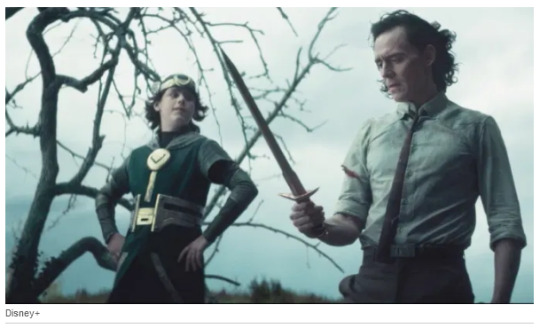
EXCLUSIVE: “I have learned, at this point, having said goodbye to the character more than twice, two and a half times maybe, to make no assumptions,” says Loki’s Tom Hiddleston as the hours tick away to the finale of the Disney+ series drops early on Wednesday morning. “We’ll see where the ride goes now,” the Marvel alum adds. As always with almost any project from the Kevin Feige run studio, that ride could continue, at least in some form or another. Certainly, the June 9 ‘Glorious Purpose’ premiere of the Michael Waldron penned and Kate Herron directed Loki proved to be the Disney+ and the MCU’s biggest small screen success so far. Also with any Marvel project, past Emmy winner Hiddleston was elusive on what could be coming next, be it in the Loki finale, another season or another appearance in the movies as the MCU shifts into its next phrase.
One thing is clear, after a decade playing the God of Mischief, Hiddleston still has a lot of Loki on the brain, in the best way.
Leading towards the finale, I chatted with a UK-based Hiddleston about returning to play Loki and the search for who or what controls the seemingly all knowing, all powerful Time Variance Authority. The Night Manager star also spoke about filming during the coronavirus pandemic, working with Owen Wilson, Gugu Mbatha-Raw, Wunmi Mosaku, Richard E. Grant, and Sophia Di Martino, who portrays variant and soulmate Sylvie, and his upcoming AppleTV+ series The Essex Serpent with Claire Danes.
DEADLINE: There’s a great line in this season’s penultimate episode where your Loki and Sylvie are stunned at watch Richard E. Grant’s Classic Loki recreate Asgard to distract Alioth and you say “I think we’re stronger than we realize.” There seems to be a great resonance in the line that there’s a whole lot of Loki coming in the finale and probably more …
HIDDLESTON: I suppose it resonates with the theme that we all wanted to highlight about purpose and about meaning. Loki’s someone who’s probably been deluded by the idea that he’s burdened with glorious purpose, and that perhaps that purpose has been revealed to be fraudulent or meaningless, and maybe his self-image or the role that he has condemned himself to play is redundant.
His experiences through this story have shown him that there are actually more opportunities available to him, and you know, it speaks to this idea, like, can we change? Can we evolve, and in that evolution, is there room to grow? You know, so, I think the stronger than we realize I think is Loki finally understanding that, really, by caring for other people, that maybe there’s power in that, and I found that very touching, and the whole thing is an extraordinary dream.
DEADLINE: Speaking of an extraordinary dream, you have been playing Loki for a decade now, since the first Thor movie, We know you are going to do some voice work in the animated What If…? series, but how has it been having this series directly centering on him, in all his variants, so to speak?
HIDDLESTON: You know Dominic, I have enjoyed it so much, because I felt it was a gift and a privilege to be invited to come and sit at the table and think about what the show might be. Also, I suppose so many of the things that I’ve discovered about Loki as a character in the comics and a character in the Norse myths, in the canon, aspects that I’ve always thought were interesting, and understandably, there hasn’t been time or space in the movies to explore them.
DEADLINE: In terms of who he is?
HIDDLESTON: Those aspects of him have been externalized and embedded into this new story about identity itself and about integrating the disparate fragment of the many selves that he is or perhaps the many selves that we are. You know, we contain multitudes. Loki certainly contains multitudes. We have met many of those multitudes, including Alligator Loki (laughs).
DEADLINE: Sounds like you’re not done with those multitudes yet. From your POV, from conversations with Kevin (Feige) is there more that you see for the character as the MCU heads into its next stages?
HIDDLESTON: Well, I certainly don’t have Kevin’s brain or encyclopedic knowledge or capacity for invention. I’ve been on the ride for a while, and it’s been the most extraordinary journey, and to have lived through different iterations, different phases of the MCU, and I’m so grateful that I’m still here, and it’s been amazing to watch. I feel that the MCU is even more expansive, is even braver, more inclusive than it’s ever been.
DEADLINE: How so?
HIDDLESTON: I think the stories are getting really exciting. Not that they weren’t before, but I think they understand that the investment of the audience is very deep, and they don’t take it for granted for a second. So, yeah, I suppose the perspective I have on how Loki might affect the ongoing course of the MCU is this idea of the multiverse. People have already understood it when Miss Minutes is introducing Loki to the TVA. She talks about the multiverse and the war and that the sacred timeline, which is reality as we know it.
DEADLINE: It opens up the aperture certainly for new stories from all opportunities, doesn’t it?
HIDDLESTON: It raises questions of, well, maybe there are other parallel or alternate universes. Maybe there are other realities, and the possibilities there are endless. I feel that at the end of episode five, Loki and Sylvie are close to discovering the answers to the questions that they have of who is behind the TVA and that, somehow, this will provoke even more curiosity about…
DEADLINE: …Because in the Marvel Universe, answering one set of questions always leads to another set of questions, in many ways.
HIDDLESTON: Right. Yeah. Yeah, and I know that there are lots of, you know, interesting titles of movies that’ve been announced, which kind of hint at where it might be going.
DEADLINE: One of those that hasn’t been officially announced, but is rumored is a Season 2 for Loki, in gear under the temporary title of Architect on call sheets and the like …
HIDDLESTON: Well, yes, maybe, as I say, all the kind of multiple alternate realities are …it’s taken me 10 years to get a handle on this sort of mono timeline. The idea that this might be a multiverse is actually beyond my knowledge of physics
DEADLINE: Well, I doubt that, but let me ask, and no spoilers for the finale or further, but if Kevin, Marvel, Disney asked you to do more Loki, are you game?
HIDDLESTON: (laughs) I have learned, at this point, having said goodbye to the character more than twice, two and a half times maybe, to make no assumptions. So, I’m also aware that I’m only playing him because of the audience, really. So, it’s not up to me. But I do love playing him, and every time, I seem to find new, interesting things about him. So, yeah, I’m a temporary passenger on Loki’s journey, but we’ll see. We’ll see where the ride goes now.
DEADLINE: On the ride, as the finale looms, there’s a ton of fan speculation out there and so much that people have hooked on to from the show. So, as the man at the center of it, what was your favorite part of Loki the series?
HIDDLESTON: That there was meaning in the making of it.
That we crossed the finish line in the middle of a global pandemic and could create something, and more than ever, I felt really grateful for being able to do this job. I think in this there are some of those questions that we were all asking ourselves in the last 18 months in the show, you know, what do our lives mean?
I love taking Loki in new directions. I love the contributions of my fellow actors, of Owen Wilson and Sophia Di Martino and Richard E. Grant and Gugu Mbatha-Raw, and Wunmi Masaku, they all brought so much to the table, and I’ll always remember that. You know, I’ll always remember just being in Atlanta with all of them and making our bonkers show. Yeah.
DEADLINE: Making your bonkers show in Atlanta as the world, as America was still in the heat of the pandemic. What was that like, because you were in production and then everything stopped and then you came back, right?
HIDDLESTON: I mean, people have used this word a lot, but it really was unprecedented. I think we did six weeks of filming before the hiatus, and then the production was suspended for four or five months, and we came back. At first, it was unfamiliar because we had to make adjustments, but the thing I remember most of all, quite honestly, is the diligence and resilience and spirit of our cast and crew.
DEADLINE: Really?
HIDDLESTON: Yes, and it remains extremely special for me, this project, for that reason.
For me, it just demonstrated the character of these amazing people. It took a huge amount of planning and care and looking after each other. By that, I mean, being in the bubble. So, for many of us, the only other human beings we saw, really, were each other. So, we came to work, and we became a team, and the circumstances fostered this extraordinary team spirit, and so the memory of making it is really my incredible and deep respect and affection for my fellow filmmakers. People like Trish Stanard, our line producer. Richard Graves, our first AD. Kristina Peterson, our second AD. Autumn Durald, DP. Kevin Wright, our supervising producer, and so many others making sure everyone could stay safe and look after each other.
It’s really…I find it…it’s very moving, and it’s remarkable, and I just want to salute them all because I couldn’t have done any of it without them.
DEADLINE: In that vein, you have just come off filming The Essex Serpent with Claire Danes for AppleTV+. Very different from Loki, and yet also a tale of what is real and who we are. Is that what attracted you to it on some level?
HIDDLESTON: I read it and immediately connected to it. Read the screenplay, the adaptation. It’s based on a novel by Sarah Perry, which was published in 2016 and is set at the end of the 19th century. It’s an extraordinary story about uncertainty and about our deepest fears and how sometimes our fears can distort our imaginings and how our minds can lie to us. About how we have to guard against that, and Perry sets it in this extraordinary time with a beautiful leading character of Cora Seaborne, played by Claire. Anna Symon adopted it.
There’s this community on the east coast of England who believe that an ancient beast has been awakened by an earthquake and that it’s dislodged all these fossils. But perhaps, it has also dislodged this ancient underwater monster, which has been used to explain certain unusual phenomena. This was in the era when Darwin had just been published a few decades before and people are starting to think, this Charles Darwin, he’s onto something. Still, fear spreads very quickly, and it’s a very fascinating time where science and faith are in conflict.
DEADLINE: When you describe it like that it sounds very Loki indeed.
HIDDLESTON: Maybe the themes are very Loki. Maybe that’s where they join up, but I’m playing a 19th century vicar who is trying to contain his community. You feel very destabilized by all these rumors. So, yeah, to go from Loki to a vicar was definitely new, a new territory.
DEADLINE: Literally and figuratively?
HIDDLESTON: Well, it’s my first significant time in Essex, where we filmed, which I feel embarrassed about. I’ve been to Essex before, but I’ve never been to the very, very eastern, most eastern coast of Essex. It’s the Blackwater Estuary, which then feeds into the River Thames, and it’s a very ancient part of England. It’s so marshy, it’s where in Great Expectations, that’s where Pip meets Magwitch for the first time. It’s all foggy and muddy and marshy and quite atmospheric and a perfect place to set a story about of uncertainty and fear and gothic romance. Clio Barnard directed it, and working with her has been amazing.
DEADLINE: You know, it occurs to me that of all the main Marvel characters, Loki has been such a constant, yet so ethereal in so many ways too. Is it jarring for you to jump back into the role with all the uncertainty it brings?
HIDDLESTON: You know, I’ve always seen it as sort of an extraordinary and surprising constant in my life for a decade. But, I don’t take it for granted because I don’t often…you know, it may end. It has actually ended, and those endings have been conclusive. I really thought a couple of years ago, after I made Avengers: Infinity War, you know, we all know what happens in that scene, and I thought, that’s it.
I thought it’s over, and I was really proud to have been part of it. I was grateful for my time, but I thought that, my work would go off in a different direction. So, the idea that I got to come back and have another go was a complete delight, it truly was.
#loki#loki series#tom hiddleston#interview#article#deadline#loki spoilers#spoilers#loki series spoilers
18 notes
·
View notes
Text
So, I always wanted to know a bit more about Wands in the harry potter universe. Given that they are so central to life, it would be nice to have a bit more info.
The wood - we know there's like 4/5 different types of wood they choose, and they're all things they can get in region. Does that imply then that aussie wizards could have wattle, eucalyptus, or other local trees?
What about trees native to the region, JK? TELL ME
How do they choose the tree. Do they have to come from a specific place, or do wandmakers need to wander through magically inclined forests until a branch falls off into their hands, or what?
Is there like commercial plantations of these trees, to feed the constant need for all the children constantly coming into their power?
What does that look like? What are the hazards? Can the place get infested by bad magic or what? Pesticides or no?
So they find the tree, next step? Is it just like 'yes, dibs that branch' and that's it, or do they take the whole tree?
What are their conservation policies?
Or do they need to do a spell, or use a ritual or something before/during/after harvesting?
Crafting... how do they know what length and shape to make for each piece of wood? Like, is it like when artists make statues and they can already see what is inside the marble/wood, etc.?
Or do they just make as many randomly shaped wands as they can for each one... is there a magial equivalent of a lathe? Or is this all by hand?
How do they choose designs, assuming the wand isn't calling out to them? Like, some are delicately patterned, and the elder wand was straight up a**l beads???
Are there variations based on the shop, the wandmaker and the region?
The core - apart from the main question of how they get the core in there (drill a hole and slip it in? make it into a potion and soak the wand? lay it on the crafted wand and it disappears in a show of magic?), and if this is done before or after the wand is shaped...
You have to think it's a little fucked up the way they go about it, right?
Standards are like, Unicorn hair, Phoenix Feathers (Rare) and Dragon Heartstring, right?
Well how the fuck do they get these things without unethical commerical farming? Unicorn hair is easy enough, you have a herd of them on a ranch protected from bad guys or whatever (and centaurs are lobbying against it bc what the fuck magical people) and most of the strands can be picked up from where they catch / fall out by fences, in the paddock, in the barn at night, etc
But what if they just pluck them. I mean, there are places that live-pluck birds for the feathers, which is fucked up, and we know magical people see any magical creature or half-human as lesser...
Assuming things are totally ethical, best case is that the unicorns lose a bit of mane or tail hair every so often and it is sourced from the field. Worst case, they are trapped in stalls all day every day and shaved beyond acceptable (look up horse tails, it's not all hair) to the detriment of the animals...
Ideally, but more impracticably, the wandmakers could wander through the forest and meet at a certain place with wild herds. They bring the carrots, the unicorns hand over a few strands once a year...
\I know unicorn cores are meant to be harder to turn to the dark arts but like... what if the unicorns are upset, stressed and angry? You'd think that would turn on them, right?
Phoenix Feathers... well they're rare. I think they probs have to get it willingly, or it doesn't work. Wasn't that in the books somewhere?
But it wouldn't have to be. I mean, they're an immortal resource... even if you mistreat a phoenix, it cant escape in death.
You just have to wait a bit for it to regrow, and there's probs spells to help speed that up. I mean, look how the world treats chickens (caged), would it be that hard for magical society (with fewer animal oversight committiees and laws) to pull some nonsense...
The dragon cores are the ones that always used to stress me out, as a concept, as a child. Like, there's a LOT of dragon heartstring wands, its common... that implies a lot of dead dragons.
How many hearstrings does the average dragon have, in this universe? Assuming at least four... that's only four wands, maybe eight if they cut them in half and it still works.
So, are they commercially farmed? Is Charlie Weasley complicit in dragon farming with the goal of harvesting the animals for parts? What happened to the dragons from the Triwizard Tournament? Is there a first year with a Special Dragon Heartstring wand?
Also, would they need to prep them specially?
What variations are there, as well? Like these are the main 3, but other countries and places have to have others, or have tried other magical things?
Do you think there are houself ears, or Centaur tendons, or mermaid fins, or kraken tentacles, or niffler claws, or goblin teeth, or redcap blood, in their wands? And it only phased out of common production recently as new protections came in for magical races?
Is there a blackmarket trade for illegal cores and if you have enough it can be 'verified' as a legal core...? There are implications here.
So you have the core, you have the wood, you have the wandmaker who slapped it together and imbued it with magic... you have a wand. Does it do a little sparkle or something when it works?
Are there wands that get to the end of the process and just... fail to work? How do they dispose of them?
Do they put resin or a protective potion/agent on it? They have to last for years, right?
Longevity - So you have a wand your entire life, unless it breaks or it is taken for being a Bad Naughty Little WizardTM... for one, how does the wand choose the person? Even if we slap a 'magic' bandaid on it, there are still more questions about it.
Do you lose your wand if you become impaired? Like, would a magical doctor remove your wand if you got dementia and 'lost capacity'?
But then, how would it control your innate magic? The stuff you can do wandless? Off topic.
So you pass away, is your wand typically buried with you?
Is it given to a family member? If so, then how does that work because the info the author gave was it was one wand = one person, pick each other etc. Assuming it does bond to that other family member, who is probably young enough to not have their own wand yet... does that mean their perfect wand will never be bought?
If not, what normally occurs?
Does the wand get taken by the council Dept of Births, Deaths, Marriages and Magical Incineration to be checked over and reset to 0? Does it get returned to the Wandsmith shoppe who made it, so they can check it is fine to be reused?
Does your wand choose another person, who will never know how well it once fit into your hand? The atrocities you committed with it?
How does this system work? Is there magic recycling, or is it all waste...?
Are cores from animals who did not consent at greater risk of turning the bearer evil?
What if your wand breaks... like Ron's did?
Like... he had an older relative's wand, so he got a proper wand that matched him. But what if your Perfect Match of a wand is damaged?
Why is there no option to have the wand repaired properly...
If humans today would rather die than get a replacement roomba, you have to assume people would be pretty damn attached to their wands... maybe more than usual. Is it about profit? Or can they just not fix it? What are the limitations on fixing a wand, or is it just not considered at all?
Is there... wand insurance?
Like, it feels like there was a lot to talk about...
#things i have wondered during hours coughing and drivin#g#harry potter#the author is dead#so i turn to the fandom and people who probs thought of this first#lets make some LORE
12 notes
·
View notes